What To Know About Medicinal Herbal Baths
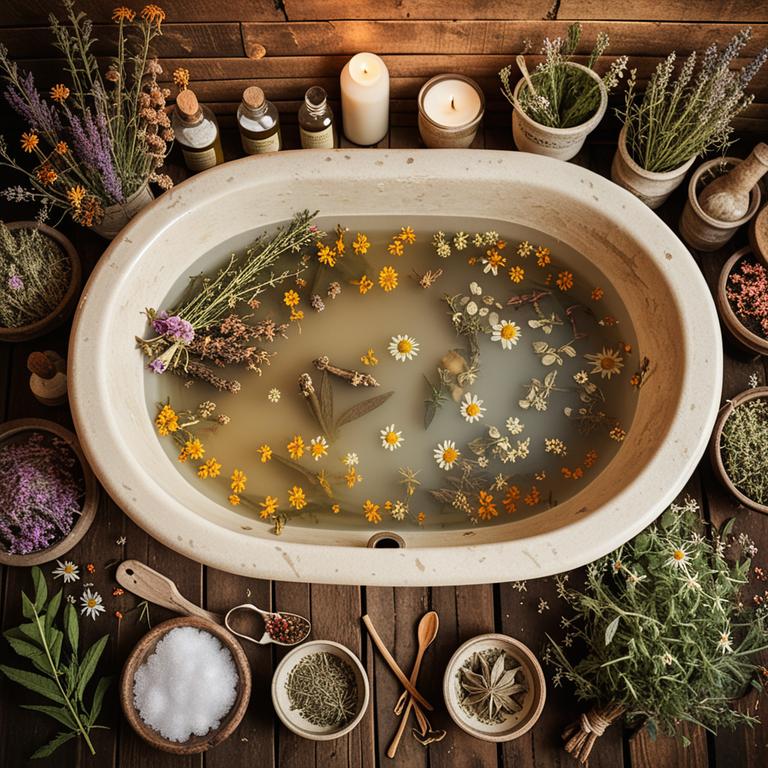
Herbal baths have long been used for their therapeutic benefits, with certain herbs standing out for their medicinal properties.
Epsom salt baths, infused with lavender or chamomile, are particularly effective for relaxation and muscle relief. Peppermint and eucalyptus baths can help alleviate congestion and ease respiratory issues, while ginger baths are known for their warming effects and ability to soothe sore muscles. Additionally, oatmeal baths are excellent for soothing irritated skin and reducing inflammation.
These natural remedies not only promote physical well-being but also contribute to mental relaxation and overall wellness.
FREE Herb Drying Checklist
How to make sure every batch retains maximum flavor, color, and aroma without the risk of mold or over-drying. Eliminate guesswork and trial-and-error, making herb drying faster, easier, and more efficient every time.
Table of Contents
- 1. Stinging nettle (Urtica dioica)
- 2. Salvia (Salvia officinalis)
- 3. English lavender (Lavandula angustifolia)
- 4. Rosemary (Rosmarinus officinalis)
- 5. Yarrow (Achillea millefolium)
- 6. St. john's wort (Hypericum perforatum)
- 7. Ginger (Zingiber officinale)
- 8. German chamomile (Chamomilla recutita)
- 9. Peppermint (Mentha piperita)
- 10. Thyme (Thymus vulgaris)
- 11. Field horsetail (Equisetum arvense)
- 12. Dog rose (Rosa canina)
- 13. Chaste tree (Vitex agnus-castus)
- 14. Camellia (Camellia sinensis)
- 15. Blessed thistle (Cnicus benedictus)
- 16. Echinacea (Echinacea purpurea)
- 17. Thistle (Silybum marianum)
- 18. Anise (Pimpinella anisum)
- 19. Ceylon cinnamon (Cinnamomum verum)
- 20. Lemon balm (Melissa officinalis)
- 21. Black pepper (Piper nigrum)
- 22. Chamomile (Matricaria chamomilla)
- 23. Turmeric (Curcuma longa)
- 24. Wormwood (Artemisia vulgaris)
- 25. Ceylon cinnamon (Cinnamomum zeylanicum)
- 26. White water lily (Nymphaea alba)
- 27. Fennel (Foeniculum vulgare)
- 28. Tree peony (Paeonia suffruticosa)
- 29. Parsley (Petroselinum crispum)
- 30. Common mallow (Symphytum officinale)
- 31. Sutherlandia frutescens
- 32. Licorice (Glycyrrhiza glabra)
- 33. Bloodroot (Sanguinaria canadensis)
- 34. Eucalyptus (Eucalyptus globulus)
- 35. Black elderberry (Sambucus nigra)
- 36. Valerian (Valeriana officinalis)
- 37. Common grape (Vitis vinifera)
- 38. Lemon grass (Cymbopogon citratus)
- 39. Sanguisorba (Sanguisorba officinalis)
- 40. Cumin (Cuminum cyminum)
- 41. Aloe barbadensis
- 42. Oregano (Origanum vulgare)
- 43. Wormwood (Artemisia absinthium)
- 44. Marigold (Calendula officinalis)
- 45. Purple coneflower (Echinacea angustifolia)
- 46. Mountain arnica (Arnica montana)
- 47. Greek oregano (Satureja hortensis)
- 48. Soaproot (Saponaria officinalis)
- 49. White cedar (Thuja occidentalis)
- 50. Plantain (Plantago lanceolata)
- 51. Kudzu (Pueraria lobata)
- 52. Lemon grass (Cymbopogon martini)
- 53. Common plantain (Plantago major)
- 54. Ginkgo (Ginkgo biloba)
- 55. Catnip (Nepeta cataria)
- 56. Black cumin (Nigella sativa)
- 57. Geranium (Pelargonium graveolens)
- 58. Marshmallow (Althaea officinalis)
- 59. Pumpkin (Cucurbita pepo)
- 60. Melaleuca (Melaleuca alternifolia)
- 61. Spiraea ulmaria
- 62. Sacred lotus (Nelumbo nucifera)
- 63. Sandalwood (Santalum album)
- 64. Citrus sinensis
- 65. Garlic (Allium sativum)
- 66. Hemp (Cannabis sativa)
- 67. Poppy (Papaver rhoeas)
- 68. St. john's wort (Agrimonia eupatoria)
- 69. Poison ivy (Rhus toxicodendron)
- 70. Smooth sumac (Rhus typhina)
- 71. Common peony (Paeonia officinalis)
- 72. Mock orange (Syringa vulgaris)
- 73. Nux vomica (Strychnos nux-vomica)
- 74. Chinese peony (Paeonia lactiflora)
- 75. Potato (Solanum tuberosum)
- 76. Goldenseal (Hydrastis canadensis)
- 77. Citron (Citrus aurantium)
- 78. Basil (Ocimum basilicum)
- 79. Pogostemon (Pogostemon cablin)
- 80. Scots pine (Pinus sylvestris)
- 81. Garden nasturtium (Nasturtium officinale)
- 82. Heartworts (Leonurus cardiaca)
- 83. Kava (Piper methysticum)
- 84. Blueberry (Vaccinium myrtillus)
- 85. Coltsfoot (Tussilago farfara)
- 86. Opium poppy (Papaver somniferum)
- 87. Cymbopogon flexuosus
- 88. Melilot (Melilotus officinalis)
- 89. Indian frankincense (Boswellia serrata)
- 90. Buckwheat (Plantago ovata)
- 91. Cyperus rotundus
- 92. Oat (Avena sativa)
- 93. Verbenas (Verbena officinalis)
- 94. Maca (Lepidium meyenii)
- 95. Parsley (Petroselinum sativum)
- 96. Black cohosh (Cimicifuga racemosa)
- 97. Wheat (Triticum aestivum)
- 98. Cucumber (Cucumis sativus)
- 99. Goosefoot (Chenopodium album)
- 100. Golden root (Rhodiola rosea)
1. Stinging nettle (Urtica dioica)

Urtica dioica herbal baths are used to soothe skin irritations and promote relaxation through their anti-inflammatory and detoxifying properties.
The plant, commonly known as stinging nettle, contains compounds that can help reduce redness, itching, and swelling associated with conditions like eczema or psoriasis. These baths are also believed to support the body's natural detoxification processes by encouraging the elimination of toxins through the skin. Additionally, the warming effect of the bath can help ease muscle tension and improve circulation, making it beneficial for individuals with arthritis or chronic fatigue.
Overall, urtica dioica herbal baths are valued for their holistic approach to wellness, combining therapeutic benefits with a calming sensory experience.
2. Salvia (Salvia officinalis)

Salvia officinalis herbal baths are used to promote relaxation and ease muscle tension by leveraging the calming properties of sage.
The essential oils and compounds found in sage leaves can help soothe the nervous system, reducing stress and anxiety. These baths are also known to improve skin health by reducing inflammation and promoting a sense of cleanliness. Additionally, salvia officinalis is believed to have antimicrobial properties that can help cleanse the skin and prevent infections.
Overall, these herbal baths offer a natural and holistic approach to wellness, combining aromatherapy with therapeutic benefits for both the body and mind.
3. English lavender (Lavandula angustifolia)

Lavandula angustifolia herbal baths are used to promote relaxation and alleviate stress by soothing the nervous system through the calming properties of lavender essential oils.
These baths can also help reduce symptoms of anxiety and insomnia by creating a peaceful environment that encourages mental tranquility. The antibacterial and anti-inflammatory properties of lavender make it effective in soothing skin irritations and minor wounds when used in bath water. Additionally, lavender baths are known to improve sleep quality by fostering a calming atmosphere that aids in winding down after a long day.
Overall, the use of lavandula angustifolia in herbal baths offers both physical and psychological benefits, making it a valuable remedy for overall well-being.
4. Rosemary (Rosmarinus officinalis)

Rosmarinus officinalis herbal baths are used to promote relaxation and alleviate muscle tension by stimulating blood circulation and reducing inflammation.
The essential oils in rosemary are known to have calming properties that can ease stress and anxiety, making these baths beneficial for mental well-being. Additionally, rosemary baths can help improve skin health by cleansing and rejuvenating the skin, thanks to its antimicrobial and antioxidant properties. They are also believed to enhance cognitive function when used in aromatherapy, supporting mental clarity and focus.
Overall, rosmarinus officinalis herbal baths offer a holistic approach to wellness, combining physical and emotional benefits for a more balanced state of health.
5. Yarrow (Achillea millefolium)

Achillea millefolium herbal baths are used to promote skin health and alleviate various skin conditions due to their anti-inflammatory and antimicrobial properties.
These baths can help reduce symptoms of eczema, psoriasis, and other inflammatory skin disorders by soothing irritation and reducing redness. The herb is also believed to have a calming effect on the nervous system, making it beneficial for stress-related skin issues. Additionally, achillea millefolium is rich in antioxidants, which can help protect the skin from environmental damage and promote a more even complexion.
Overall, these baths offer a natural and holistic approach to skincare, supporting both physical and emotional well-being.
6. St. john's wort (Hypericum perforatum)

Hypericum perforatum herbal baths are used to promote relaxation and alleviate symptoms of mild depression by leveraging the plant's calming properties.
The active compounds in St. John's Wort, such as hypericin and hyperforin, are believed to support mood regulation and reduce anxiety when absorbed through the skin during a bath. These baths are also popular for their soothing effects on the skin, helping to reduce inflammation and promote healing in minor skin irritations. Additionally, they are often used to ease symptoms of seasonal affective disorder by enhancing overall well-being and emotional balance.
Due to their natural and holistic approach, hypericum perforatum herbal baths are favored by those seeking alternative or complementary therapies for mental and physical wellness.
7. Ginger (Zingiber officinale)

Zingiber officinale herbal baths are used to promote relaxation and alleviate muscle tension by harnessing the warming properties of ginger.
The active compounds in ginger, such as gingerol and shogaol, have anti-inflammatory and analgesic effects that can help reduce pain and swelling in the muscles and joints. These baths are also beneficial for improving circulation, as the heat from the bath combined with ginger's natural properties can stimulate blood flow throughout the body. Additionally, ginger has been traditionally used to support digestion and reduce nausea, making ginger baths a holistic remedy for overall well-being.
By incorporating zingiber officinale into bath rituals, individuals can enjoy both therapeutic and soothing benefits for their mind and body.
8. German chamomile (Chamomilla recutita)

Chamomilla recutita herbal baths are used to promote relaxation and soothe skin irritations due to their calming and anti-inflammatory properties.
These baths are particularly beneficial for individuals suffering from stress, anxiety, or insomnia, as the essential oils in chamomile help induce a sense of peace and tranquility. The anti-inflammatory and antiseptic qualities of chamomile make it effective in treating conditions such as eczema, psoriasis, and minor skin infections. Additionally, chamomile baths can help alleviate muscle aches and joint pain, making them a popular choice for those with arthritis or post-exercise recovery.
Overall, chamomilla recutita herbal baths offer a natural and holistic approach to enhancing both physical and mental well-being.
9. Peppermint (Mentha piperita)

Mentha piperita herbal baths are used to soothe muscle aches and promote relaxation by leveraging the calming properties of peppermint essential oils.
These baths can help alleviate symptoms of arthritis and other inflammatory conditions due to their anti-inflammatory and analgesic effects. The cooling sensation of peppermint can also help reduce fever and relieve headaches when used in a bath setting. Additionally, mentha piperita baths are known to improve circulation and ease tension in the body, making them a popular choice for stress relief and overall wellness.
Their natural composition makes them a safe and effective alternative for those seeking holistic remedies for various health concerns.
10. Thyme (Thymus vulgaris)

Thymus vulgaris herbal baths are used to promote relaxation and alleviate symptoms of stress and anxiety by incorporating the calming properties of thyme into the bathing experience.
The essential oils from thyme leaves, when added to warm water, can help soothe the nervous system and improve mood through their aromatic compounds. These baths are also beneficial for respiratory health, as inhaling the steam can help clear airways and ease breathing difficulties. Additionally, thyme’s antiseptic properties may contribute to skin health by reducing inflammation and preventing infections.
Overall, thymus vulgaris herbal baths offer a natural and holistic approach to wellness, combining therapeutic aromatherapy with the soothing effects of water.
11. Field horsetail (Equisetum arvense)

Equisetum arvense herbal baths are used to promote skin health and alleviate inflammatory conditions.
The plant, also known as horsetail, contains high levels of silica, which helps strengthen connective tissues and improve skin elasticity. These baths are often recommended for individuals suffering from eczema, psoriasis, or other chronic skin disorders due to their astringent and healing properties. The mild antiseptic qualities of equisetum arvense also help reduce bacterial infections and soothe irritated skin.
Overall, these baths offer a natural and holistic approach to skincare, supporting both physical and emotional well-being.
12. Dog rose (Rosa canina)

Rosa canina herbal baths are used to promote skin health and relieve various skin conditions due to their rich content of antioxidants, vitamins, and anti-inflammatory compounds.
These baths can help reduce inflammation, soothe irritations, and improve the overall texture and appearance of the skin. The natural astringent properties of Rosa canina make it effective in treating eczema, psoriasis, and other inflammatory skin disorders. Additionally, the soothing aroma of the rose hips can have a calming effect, helping to reduce stress and enhance relaxation.
Overall, Rosa canina herbal baths are a natural and beneficial remedy for maintaining healthy, clear, and rejuvenated skin.
13. Chaste tree (Vitex agnus-castus)
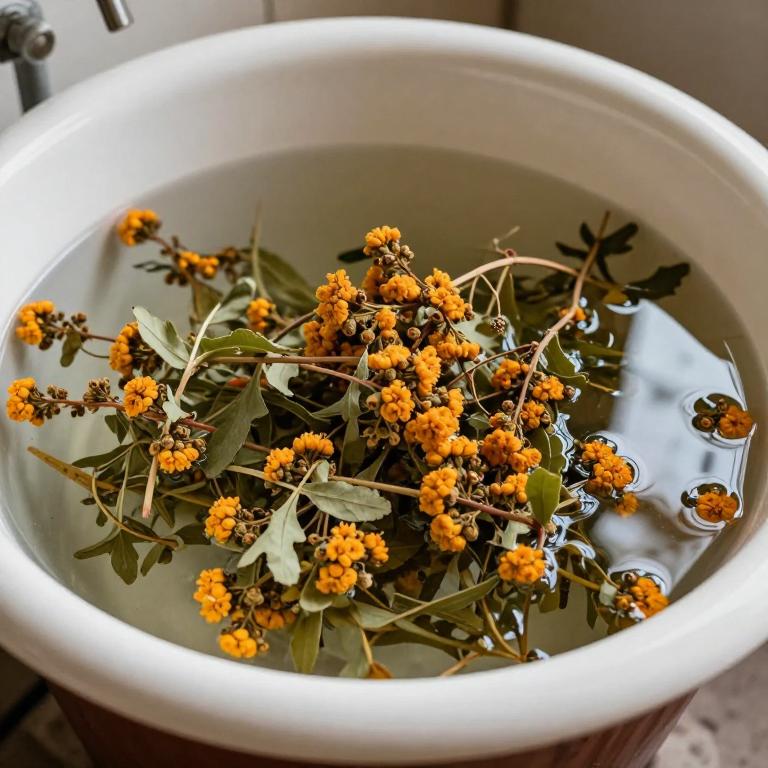
Vitex agnus-castus herbal baths are used to support hormonal balance, particularly in women experiencing menstrual irregularities or premenstrual syndrome (PMS).
The plant, also known as chaste tree, contains compounds that may help regulate the production of luteinizing hormone and prolactin, which are crucial for reproductive health. These baths can promote relaxation and reduce stress, which in turn may alleviate symptoms related to hormonal fluctuations. Additionally, the soothing properties of vitex can help ease discomfort during menstruation and improve overall emotional well-being.
Due to its calming and restorative effects, vitex agnus-castus herbal baths are a popular natural remedy for enhancing both physical and emotional health.
14. Camellia (Camellia sinensis)
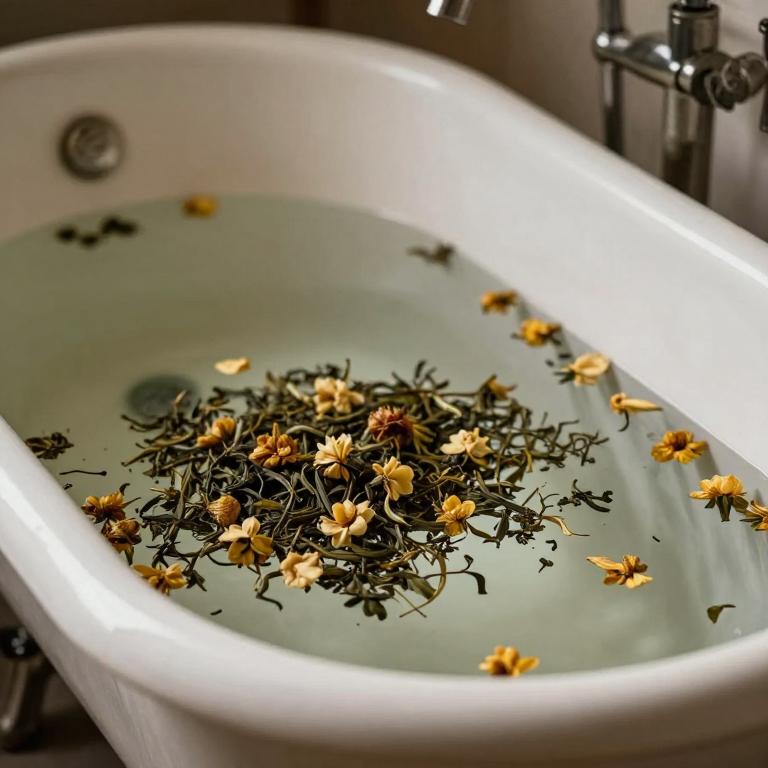
Camellia sinensis herbal baths are used to promote relaxation and reduce stress by harnessing the calming properties of tea leaves.
These baths can also help soothe skin irritations and improve overall skin health due to the antioxidants and anti-inflammatory compounds present in the tea. The warm water combined with the natural extracts from camellia sinensis can enhance blood circulation and ease muscle tension. Additionally, they are believed to have a calming effect on the mind, making them ideal for meditation or mindfulness practices.
Overall, camellia sinensis herbal baths offer a holistic approach to wellness by combining the therapeutic benefits of natural ingredients with the soothing effects of water.
15. Blessed thistle (Cnicus benedictus)
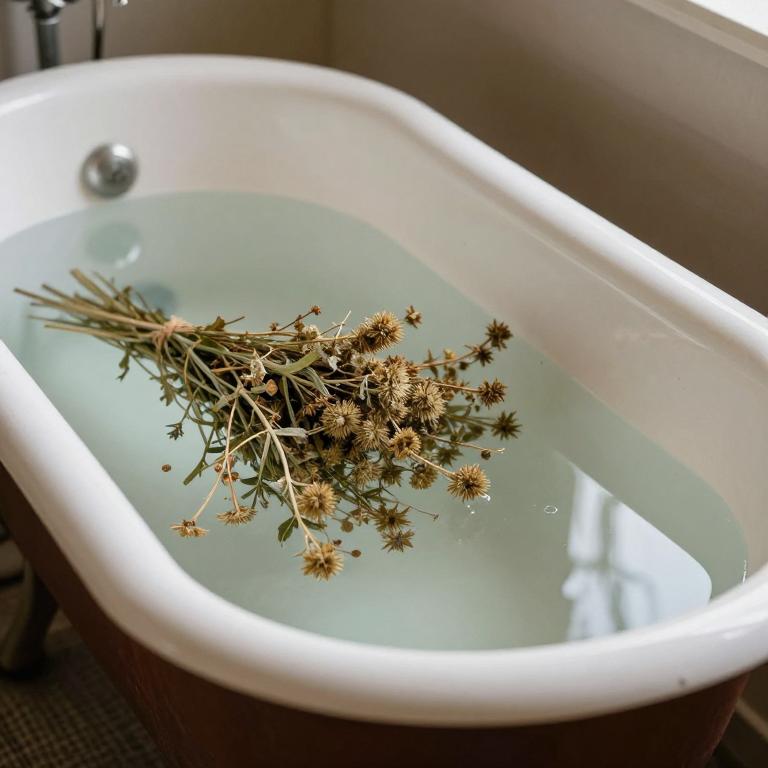
Cnicus benedictus herbal baths are used to promote relaxation and ease muscle tension by harnessing the soothing properties of the plant.
These baths are often recommended for individuals experiencing stress, anxiety, or chronic fatigue due to their calming effects on the nervous system. The essential oils and active compounds in Cnicus benedictus can help reduce inflammation and improve circulation, making them beneficial for skin conditions such as eczema or psoriasis. Additionally, the aromatic qualities of the plant can enhance the sensory experience of bathing, contributing to overall well-being.
Because of its natural therapeutic properties, Cnicus benedictus herbal baths are increasingly popular in holistic and alternative medicine practices.
16. Echinacea (Echinacea purpurea)
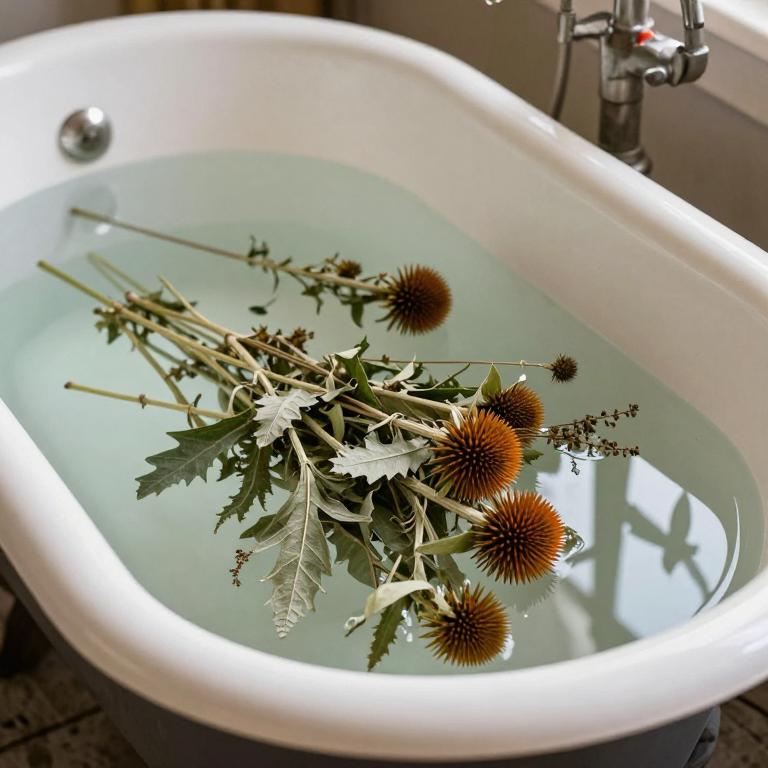
Echinacea purpurea herbal baths are used to promote skin health and enhance the body's natural defenses against illness.
The active compounds in echinacea, such as polysaccharides and alkamides, have anti-inflammatory and immune-boosting properties that can be absorbed through the skin during a bath. These baths are particularly beneficial for individuals with seasonal allergies or those seeking to support their immune system during cold and flu season. By soaking in an echinacea-infused bath, one can experience a calming effect while also potentially reducing the severity of minor infections.
This traditional herbal remedy is a gentle and soothing way to incorporate natural healing into daily self-care routines.
17. Thistle (Silybum marianum)
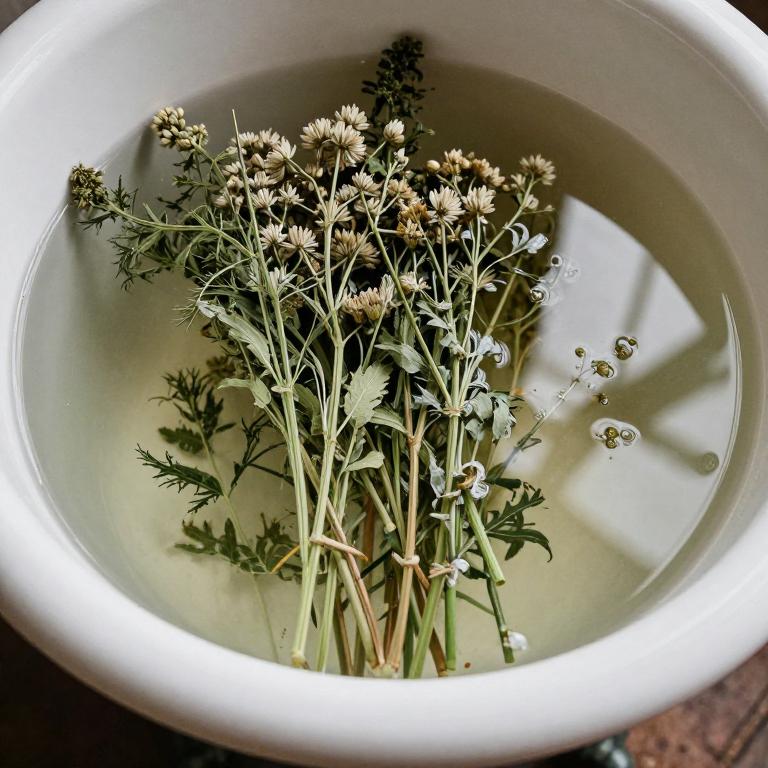
Silybum marianum herbal baths are used to promote skin health and detoxification by leveraging the plant's potent antioxidant and anti-inflammatory properties.
These baths are believed to help reduce skin conditions such as eczema, psoriasis, and acne due to the presence of compounds like silymarin, which have soothing and healing effects. The herbal infusion can also aid in eliminating toxins from the body through the skin, supporting overall wellness. Additionally, silybum marianum is known for its ability to protect the liver, making these baths beneficial for individuals seeking holistic detox support.
Overall, silybum marianum herbal baths offer a natural and therapeutic approach to improving skin condition and supporting internal health.
18. Anise (Pimpinella anisum)
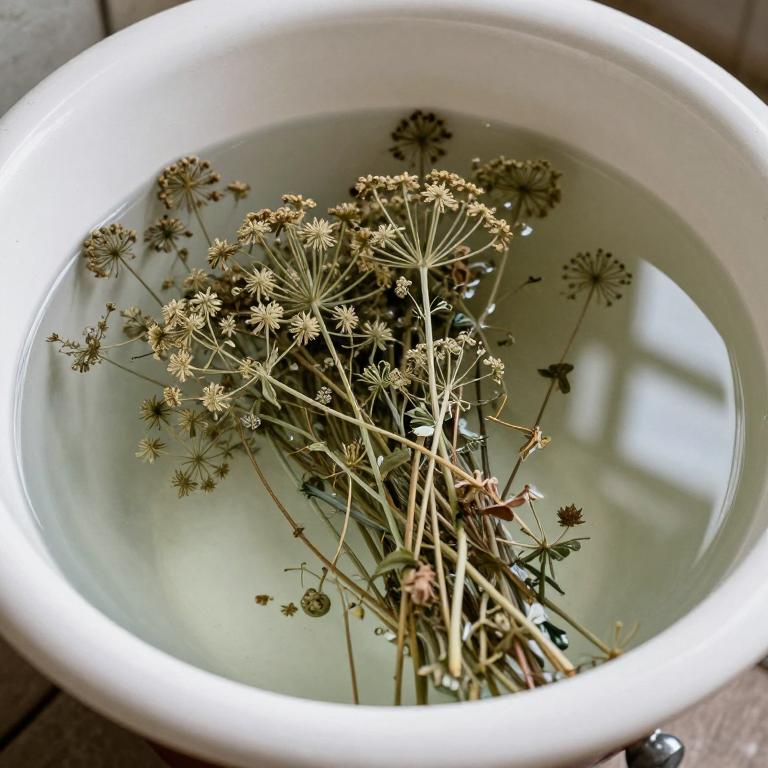
Pimpinella anisum herbal baths are used to promote relaxation and ease muscle tension by leveraging the calming properties of anise essential oils.
These baths are particularly beneficial for individuals suffering from stress-related ailments or those seeking natural remedies for muscle soreness and joint pain. The aromatic compounds in anise help to soothe the nervous system, making these baths an effective aid in reducing anxiety and improving sleep quality. Additionally, the warm water combined with the herbal infusion can enhance blood circulation and alleviate symptoms of respiratory conditions such as bronchitis or asthma.
Overall, pimpinella anisum herbal baths offer a holistic approach to wellness, integrating physical comfort with emotional well-being.
19. Ceylon cinnamon (Cinnamomum verum)
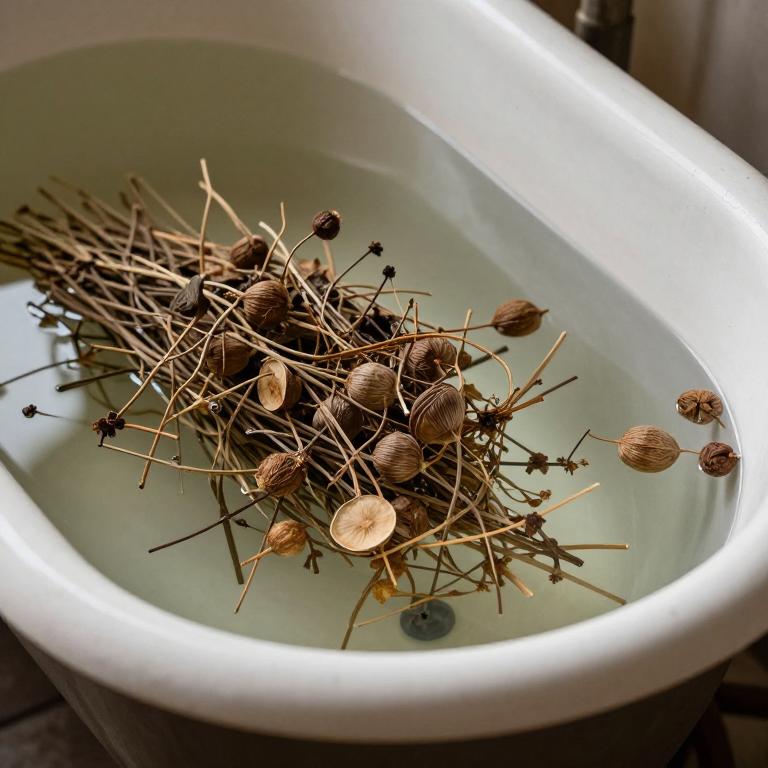
Cinnamomum verum herbal baths are used to promote relaxation and ease muscle tension by leveraging the calming properties of cinnamon.
The essential oils derived from cinnamon bark have anti-inflammatory and analgesic effects, making these baths beneficial for individuals suffering from arthritis or chronic muscle pain. Additionally, cinnamon has a warming effect on the skin, which can improve circulation and help alleviate cold-related discomfort. The aromatic qualities of cinnamon also contribute to a soothing atmosphere, enhancing mental well-being and reducing stress.
Overall, cinnamomum verum herbal baths offer a natural and holistic approach to both physical and emotional wellness.
20. Lemon balm (Melissa officinalis)
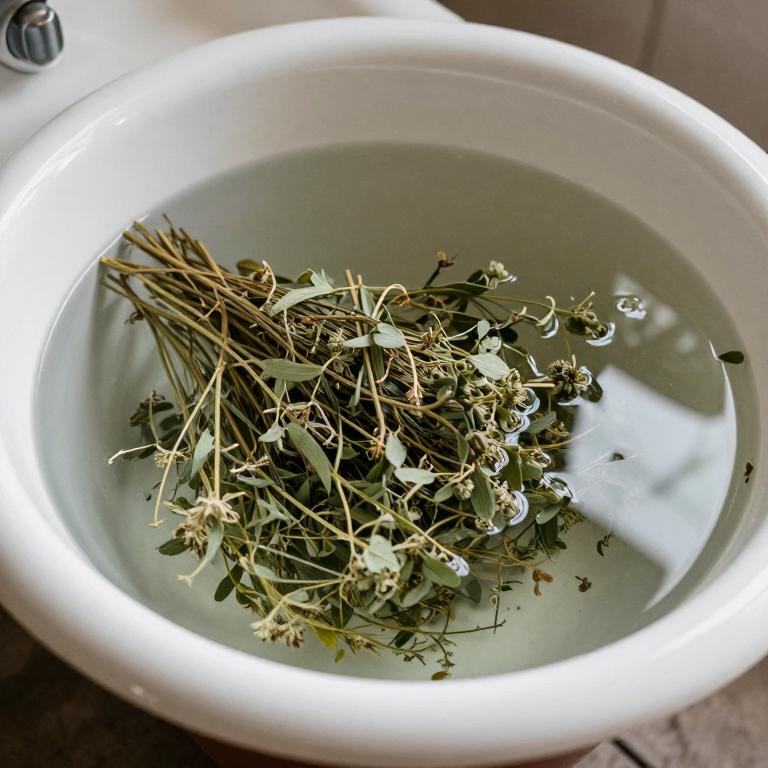
Melissa officinalis herbal baths are used to promote relaxation and reduce stress by leveraging the calming properties of lemon balm.
The essential oils and compounds found in melissa officinalis have been shown to have a soothing effect on the nervous system, making these baths ideal for individuals experiencing anxiety or insomnia. Additionally, melissa officinalis baths can help alleviate symptoms of skin irritation and inflammation due to their mild antiseptic and anti-inflammatory properties. These baths are also believed to improve mood and enhance overall well-being by encouraging a sense of tranquility and mental clarity.
Their gentle nature makes them suitable for use across various age groups, offering a natural and safe way to support both physical and emotional health.
21. Black pepper (Piper nigrum)
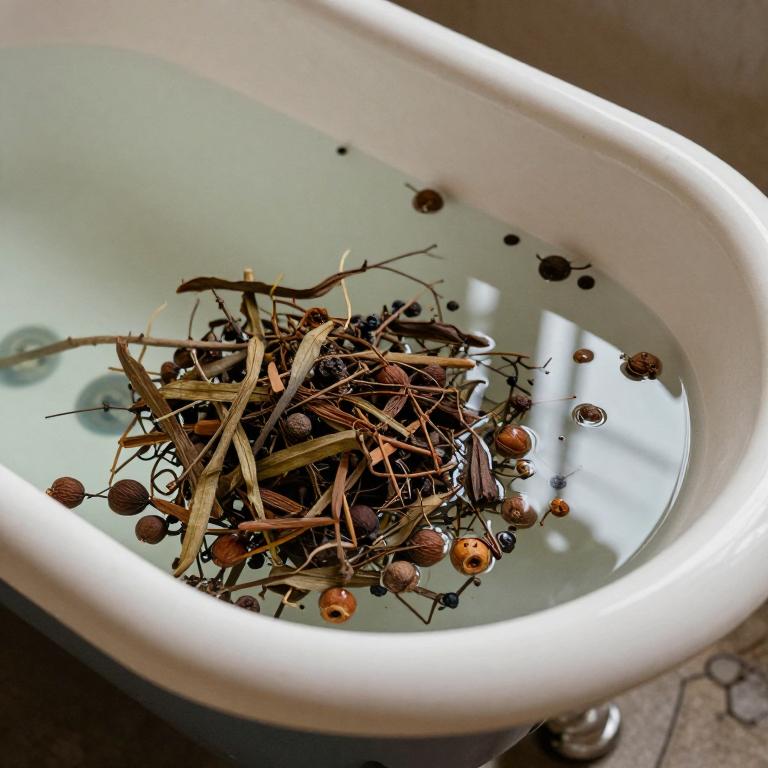
Piper nigrum herbal baths are used to promote relaxation and ease muscle tension by leveraging the natural properties of black pepper.
The active compounds in black pepper, such as piperine, have anti-inflammatory and analgesic effects that can soothe sore muscles and reduce pain. These baths are also believed to enhance circulation, helping to alleviate symptoms of colds and respiratory issues. Additionally, the aromatic qualities of black pepper can have a calming effect on the mind, reducing stress and improving overall well-being.
Due to these therapeutic benefits, piper nigrum herbal baths are increasingly popular in natural wellness practices.
22. Chamomile (Matricaria chamomilla)
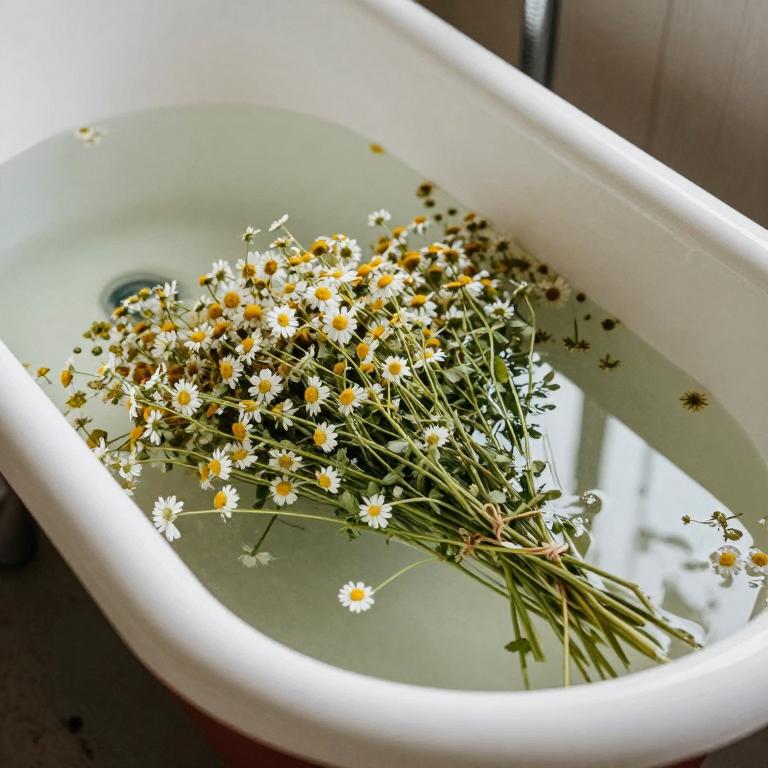
Matricaria chamomilla herbal baths are used to soothe skin irritations and promote relaxation.
The chamomile extract contains anti-inflammatory and antimicrobial properties that help reduce redness, itching, and infection in sensitive skin. These baths are particularly beneficial for individuals with eczema, psoriasis, or other inflammatory skin conditions. The calming aroma of chamomile also has a calming effect on the mind, helping to alleviate stress and improve sleep quality.
Overall, matricaria chamomilla herbal baths offer both therapeutic and relaxing benefits for the skin and mind.
23. Turmeric (Curcuma longa)
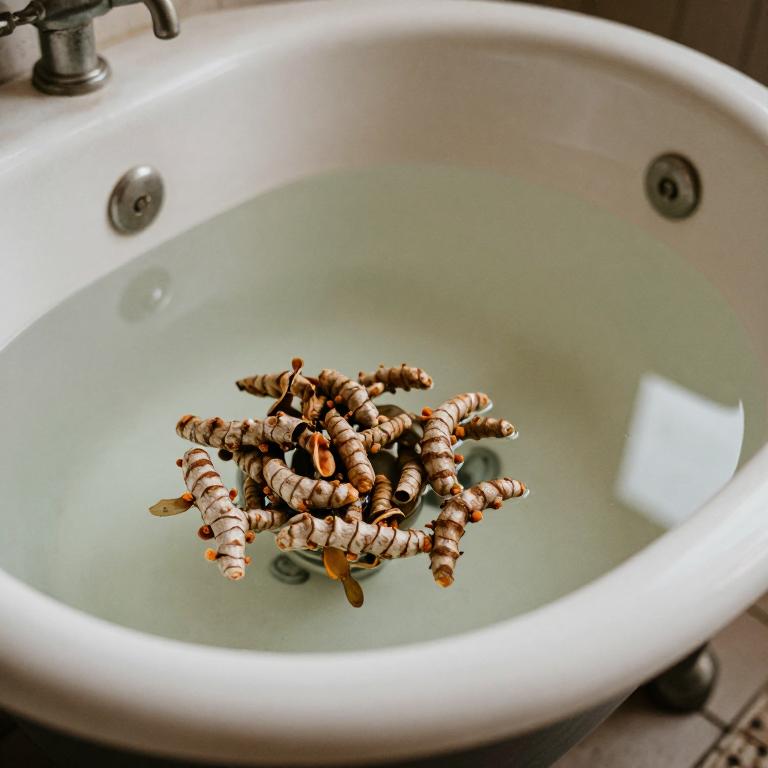
Curcuma longa herbal baths are used to promote relaxation and alleviate stress-related ailments by leveraging the anti-inflammatory and antioxidant properties of curcumin, the active compound in turmeric.
These baths are also beneficial for soothing skin conditions such as eczema and psoriasis due to their mild antiseptic and anti-itch effects. The warm water combined with turmeric creates a calming environment that helps reduce muscle tension and improve circulation, making it ideal for relieving joint pain and arthritis symptoms. Additionally, curcuma longa baths are known to enhance skin health by detoxifying and brightening the complexion, thanks to their natural cleansing and rejuvenating properties.
Overall, these baths offer a holistic approach to wellness, integrating traditional herbal knowledge with modern therapeutic benefits.
24. Wormwood (Artemisia vulgaris)
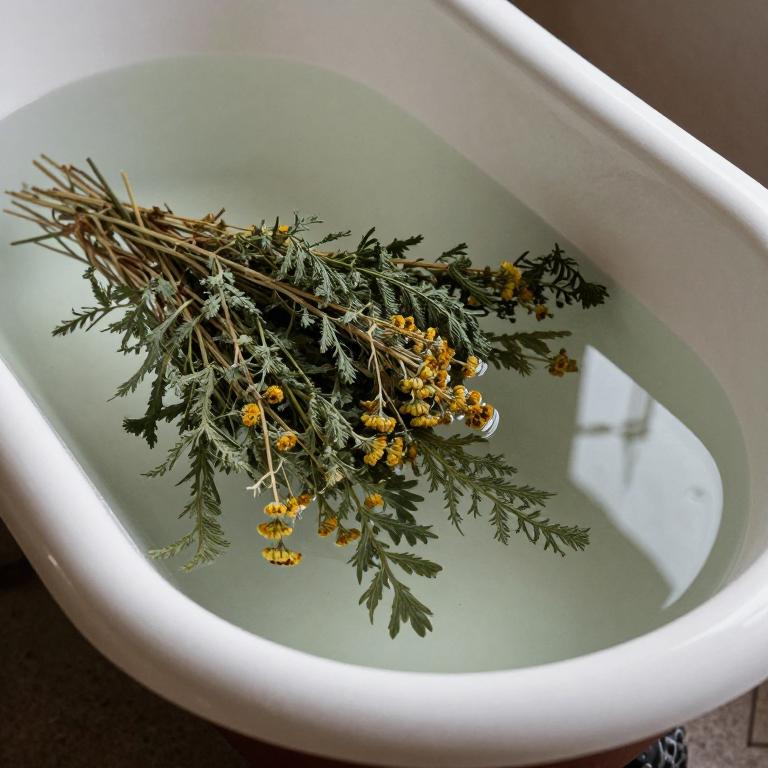
Artemisia vulgaris herbal baths are used to promote relaxation and alleviate symptoms of skin conditions such as eczema and psoriasis.
The plant contains compounds with anti-inflammatory and antimicrobial properties that can soothe irritated skin and reduce redness. These baths are also believed to help with digestive issues by promoting detoxification and improving circulation. The aromatic qualities of artemisia vulgaris can have a calming effect, making it useful for reducing stress and enhancing overall well-being.
Due to its natural therapeutic properties, artemisia vulgaris herbal baths are a popular choice in traditional medicine and holistic wellness practices.
25. Ceylon cinnamon (Cinnamomum zeylanicum)
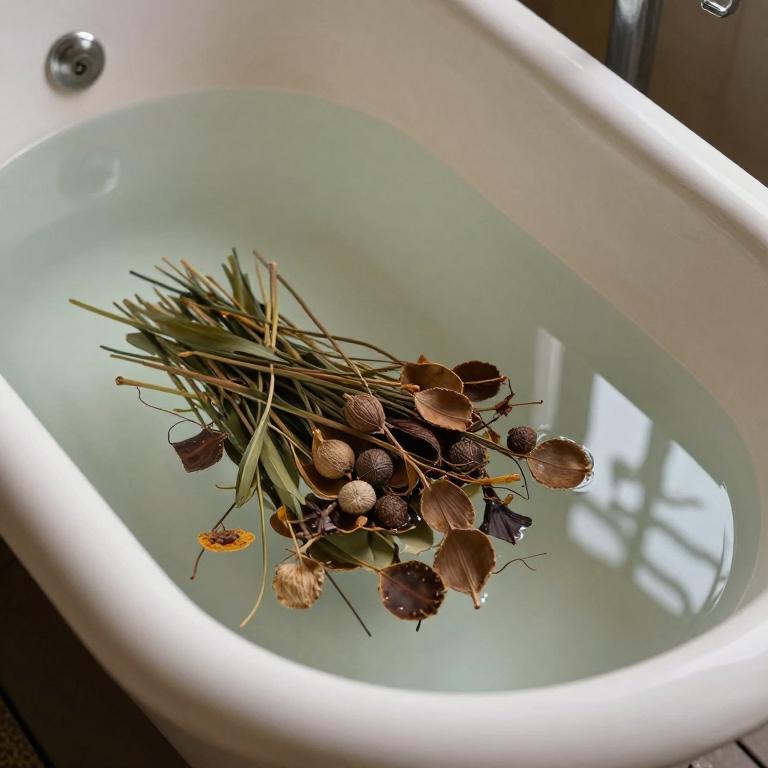
Cinnamomum zeylanicum herbal baths are used to promote relaxation and ease muscle tension through the soothing properties of cinnamon essential oils.
The aromatic compounds in cinnamon can help reduce stress and improve mood by stimulating the release of endorphins. These baths are also beneficial for improving circulation, as the warming effect of cinnamon can enhance blood flow throughout the body. Additionally, cinnamon has antimicrobial properties that may help cleanse the skin and prevent infections.
Overall, cinnamomum zeylanicum herbal baths offer a natural and holistic approach to wellness, combining therapeutic and aromatic benefits for both physical and mental well-being.
26. White water lily (Nymphaea alba)
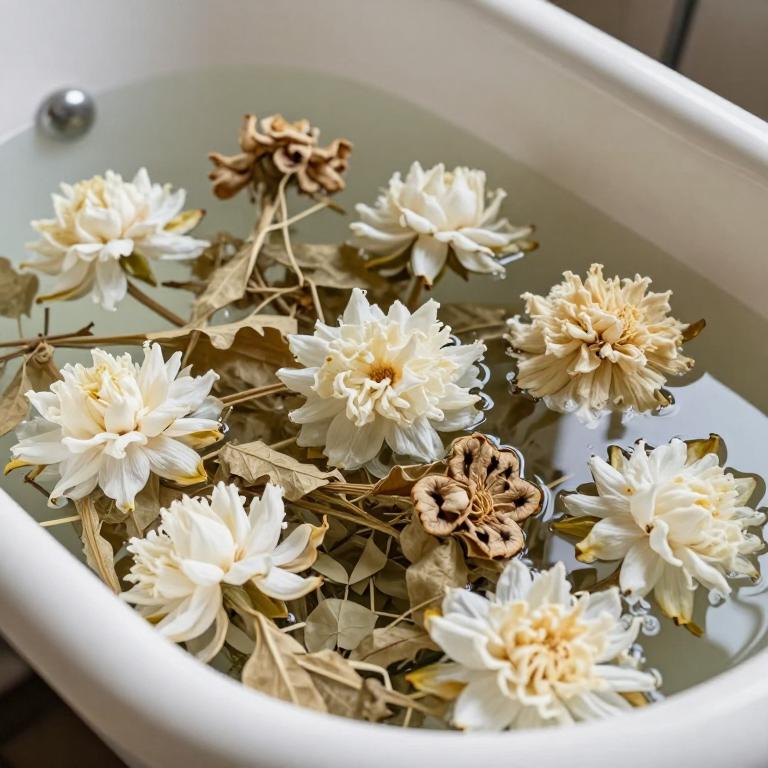
Nymphaea alba herbal baths are used to promote relaxation and reduce stress by soothing the nervous system with their calming properties.
The plant, commonly known as white water lily, contains compounds that have anti-inflammatory and analgesic effects, making these baths beneficial for relieving muscle aches and joint pain. They are also believed to support skin health by cleansing and nourishing the skin with their natural antioxidants and minerals. Additionally, the aromatic properties of nymphaea alba can enhance mental well-being and improve sleep quality when used in a bath setting.
Due to these therapeutic benefits, nymphaea alba herbal baths are increasingly popular in traditional and modern wellness practices.
27. Fennel (Foeniculum vulgare)
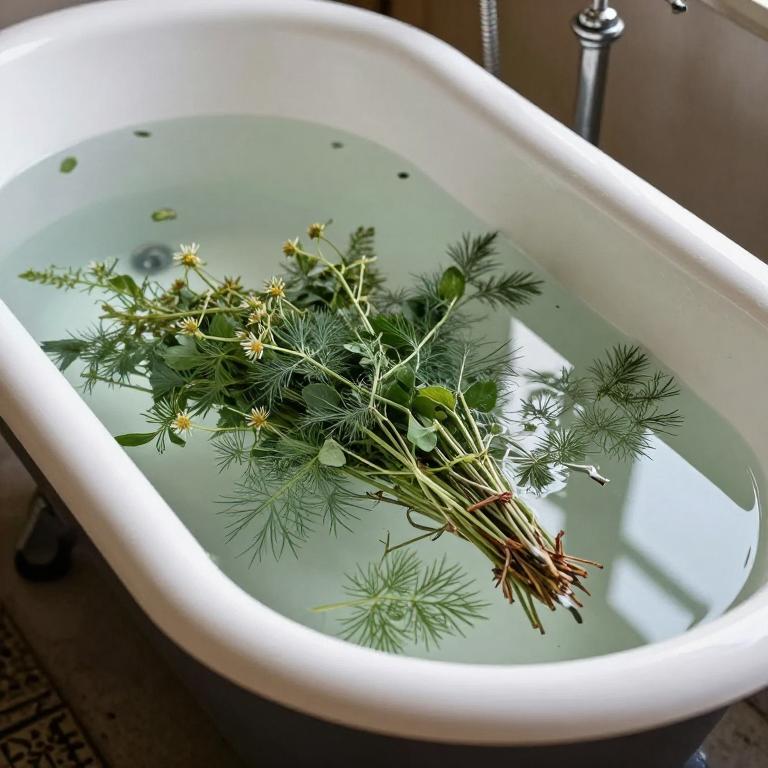
Foeniculum vulgare herbal baths are used to promote relaxation and ease muscle tension by harnessing the calming properties of fennel.
These baths can also aid in improving digestion by stimulating the release of digestive enzymes and reducing bloating. The essential oils from fennel have antispasmodic effects, making them beneficial for relieving menstrual cramps and gastrointestinal discomfort. Additionally, the aromatic compounds in fennel can help alleviate respiratory issues by easing congestion and soothing coughs.
Overall, foeniculum vulgare herbal baths offer a natural and holistic approach to wellness, combining therapeutic benefits with a pleasant sensory experience.
28. Tree peony (Paeonia suffruticosa)
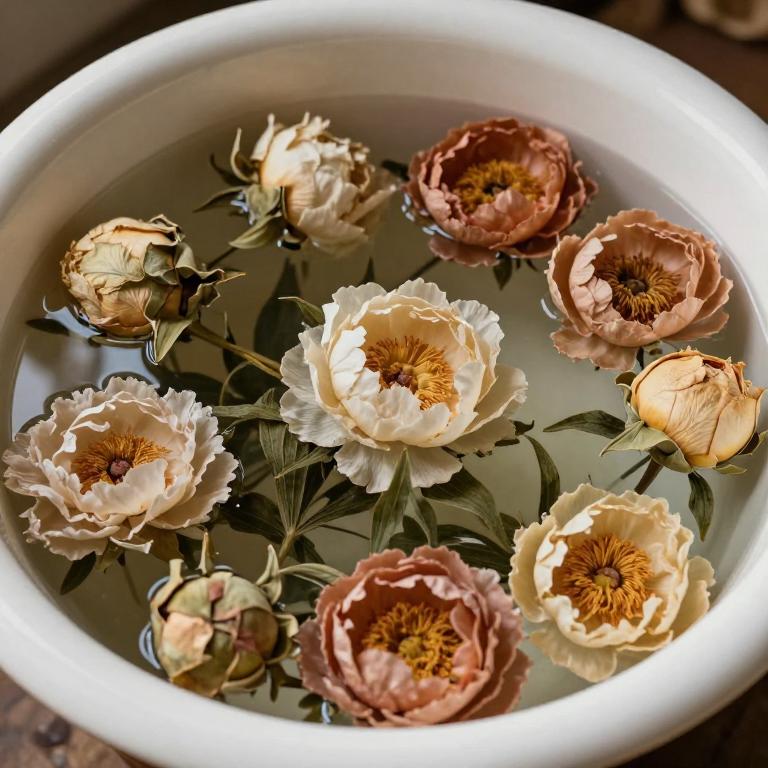
Paeonia suffruticosa herbal baths are used to promote relaxation and alleviate symptoms of stress and fatigue.
The active compounds in the plant help soothe the nervous system, making these baths ideal for reducing anxiety and improving mood. They are also known to have anti-inflammatory properties, which can help ease muscle aches and joint pain. Additionally, the aromatic qualities of the herb can enhance the overall bathing experience, contributing to a sense of well-being.
Due to their natural soothing effects, paeonia suffruticosa herbal baths are increasingly popular in traditional medicine and aromatherapy practices.
29. Parsley (Petroselinum crispum)
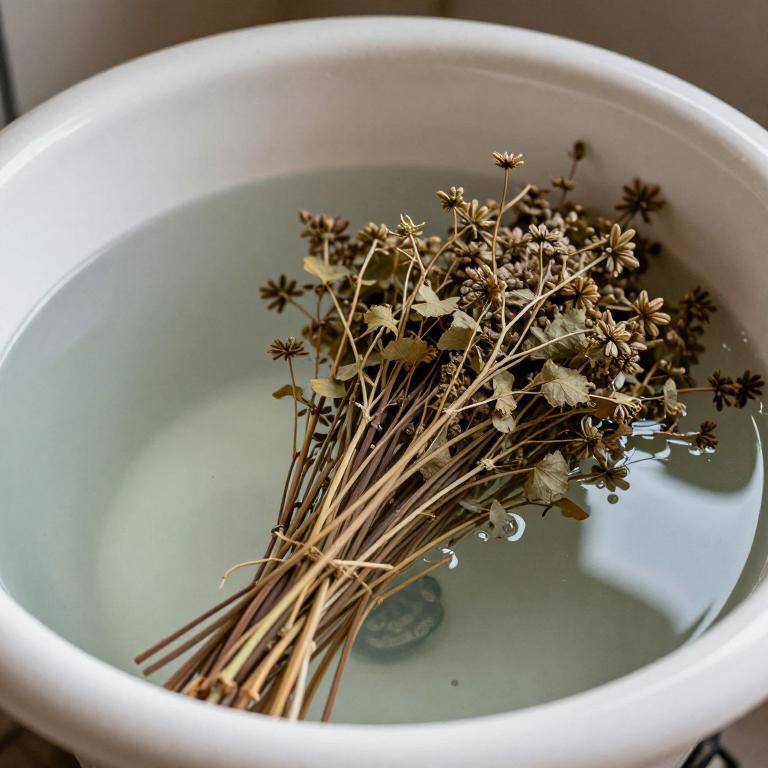
Petroselinum crispum herbal baths are used to promote relaxation and ease muscle tension by leveraging the calming properties of parsley.
The essential oils and compounds found in petroselinum crispum have soothing effects that can help alleviate stress and anxiety, making these baths ideal for mental well-being. They are also known to support skin health by reducing inflammation and improving circulation, which can benefit those with sensitive or irritated skin. Additionally, the aromatic qualities of petroselinum crispum can enhance the sensory experience of bathing, creating a spa-like environment at home.
Overall, these baths offer a natural and holistic approach to wellness, combining physical and emotional benefits.
30. Common mallow (Symphytum officinale)
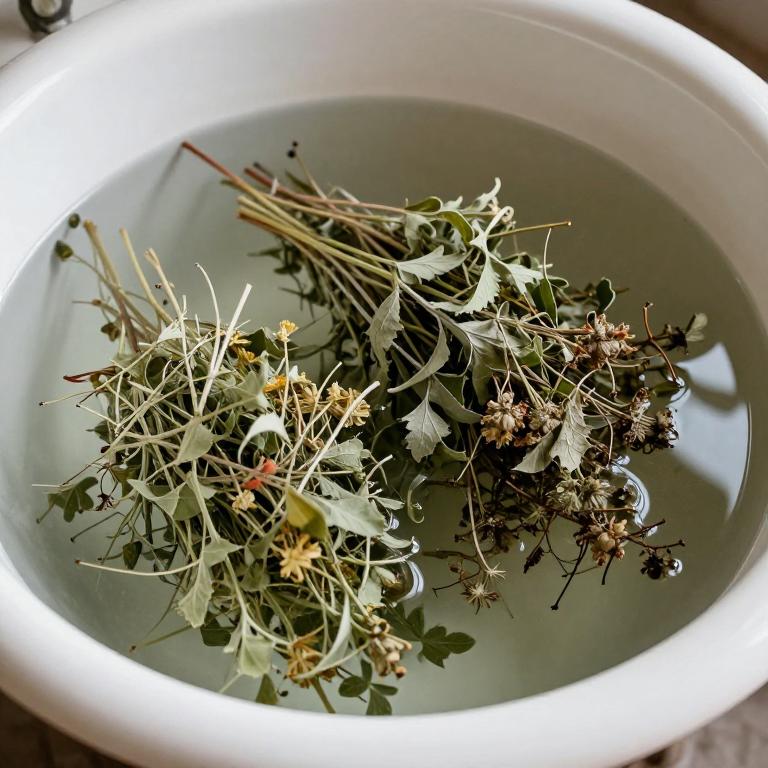
Symphytum officinale herbal baths are used to promote healing and soothe inflammation in the body, particularly in musculoskeletal conditions.
The plant, also known as comfrey, contains compounds that may help reduce pain and accelerate tissue repair when applied topically. These baths are often recommended for individuals suffering from bruises, sprains, or joint pain due to their anti-inflammatory properties. The soothing warmth of the water enhances the absorption of the herb's active ingredients, making the treatment more effective.
Additionally, symphytum officinale baths are believed to support overall skin health and may aid in the recovery from minor injuries or wounds.
31. Sutherlandia frutescens
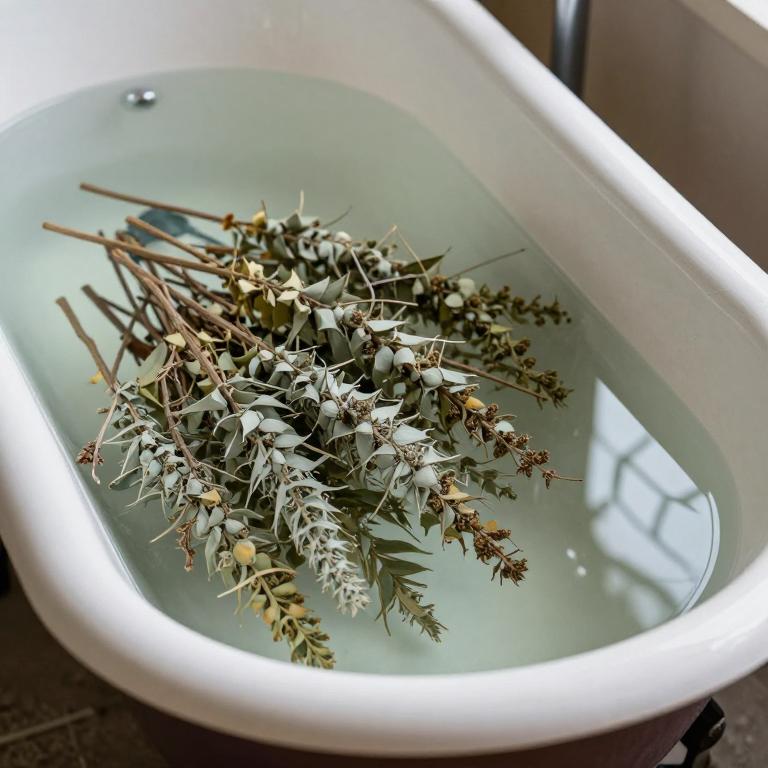
Sutherlandia frutescens herbal baths are used to promote relaxation and ease muscle tension through the soothing properties of the plant's extracts.
These baths are believed to help reduce stress and anxiety by encouraging a calming environment for the body and mind. The herb is also thought to support the immune system, making these baths beneficial for individuals seeking natural wellness support. Additionally, the anti-inflammatory properties of sutherlandia frutescens may aid in alleviating skin irritations and promoting overall skin health.
Overall, these baths are valued for their holistic approach to wellness, combining aromatherapy and herbal benefits for a balanced, restorative experience.
32. Licorice (Glycyrrhiza glabra)
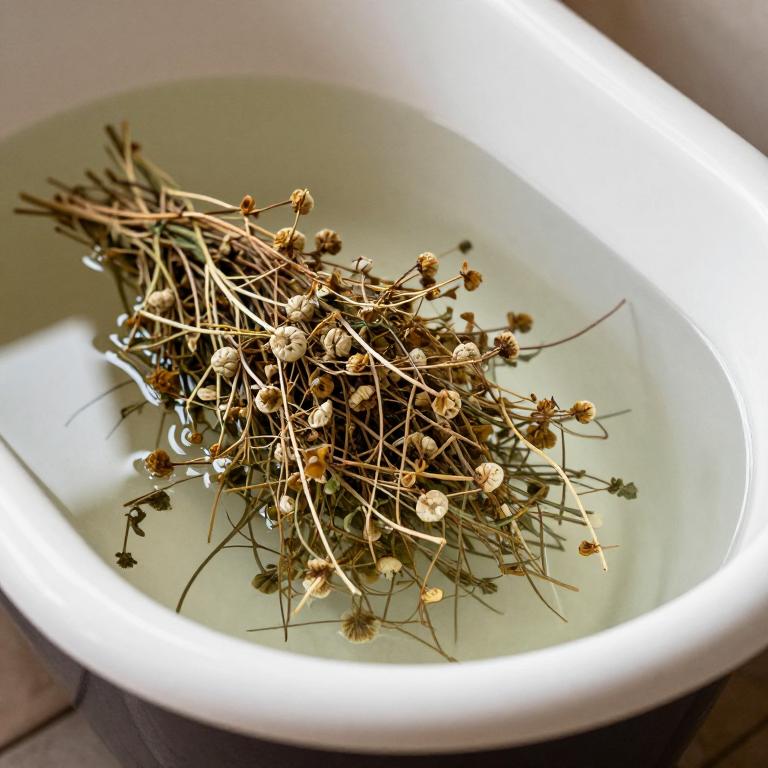
Glycyrrhiza glabra herbal baths are used to promote skin health and relieve various skin conditions due to their anti-inflammatory and soothing properties.
The active compounds in licorice root, such as glycyrrhizin and liquiritin, help reduce redness, irritation, and itching associated with eczema, psoriasis, and dermatitis. These baths can also help detoxify the skin and improve its overall texture by removing impurities and excess oils. Additionally, the mild antiviral and antibacterial properties of glycyrrhiza glabra may help combat skin infections and acne.
Regular use of these baths can contribute to a calming and rejuvenating skincare routine, enhancing both the appearance and health of the skin.
33. Bloodroot (Sanguinaria canadensis)
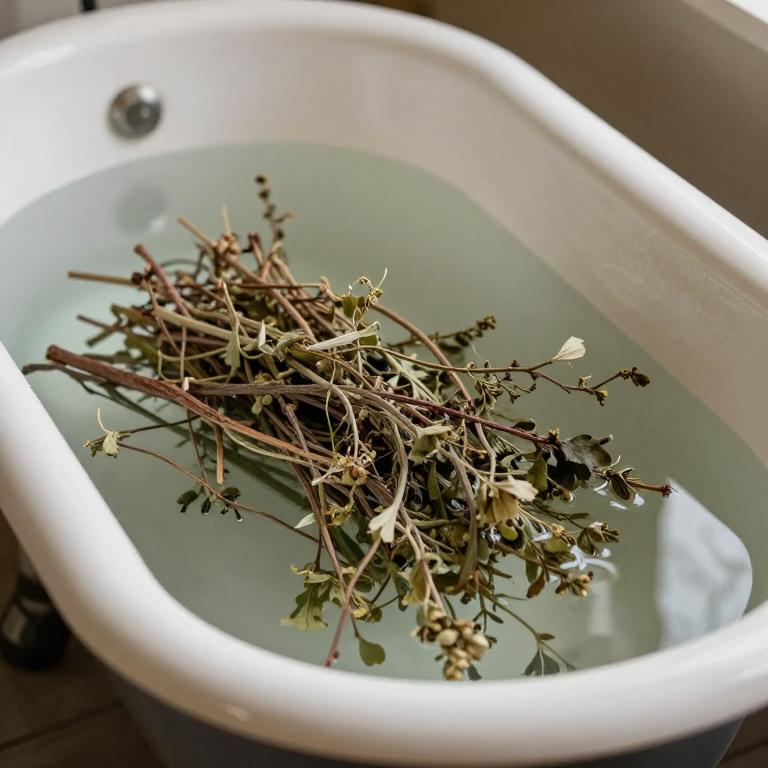
Sanguinaria canadensis herbal baths are used to promote skin health and alleviate inflammatory conditions due to their potent anti-inflammatory and astringent properties.
The root of the plant contains compounds that can help reduce redness, soothe irritations, and improve the appearance of blemishes, making it beneficial for those with acne or eczema. These baths are also believed to help detoxify the skin and enhance circulation, contributing to a more radiant complexion. The natural compounds in sanguinaria canadensis may also have antimicrobial effects, which can aid in preventing and treating minor skin infections.
Overall, these herbal baths are valued for their ability to support natural healing processes and provide a calming, therapeutic experience.
34. Eucalyptus (Eucalyptus globulus)
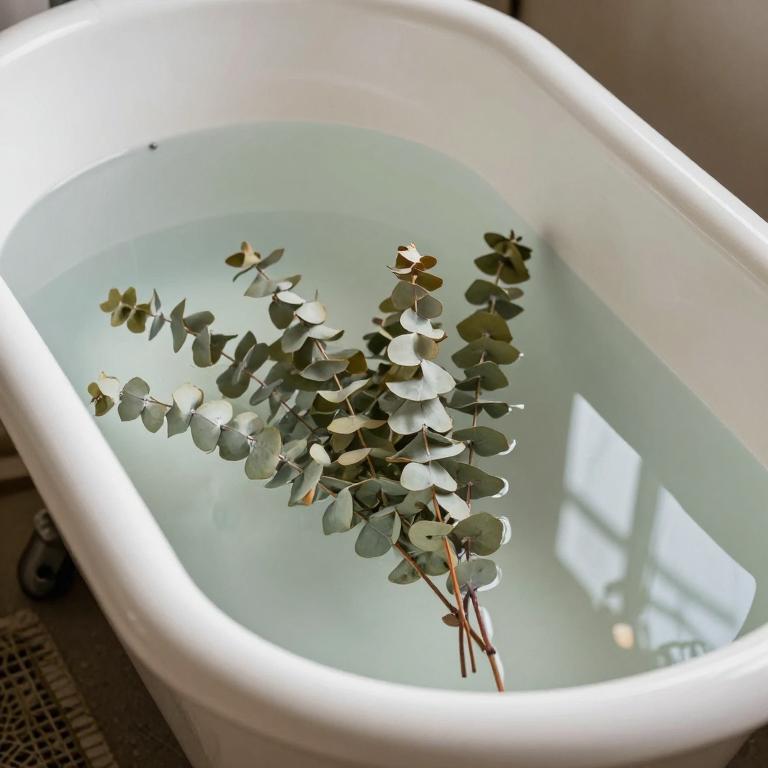
Eucalyptus globulus herbal baths are used to promote relaxation and alleviate symptoms of stress and fatigue by stimulating the release of endorphins through the absorption of essential oils through the skin.
These baths are also beneficial for respiratory health, as the aromatic compounds in eucalyptus oil can help clear nasal congestion and ease breathing when inhaled during a warm bath. Additionally, the anti-inflammatory and antimicrobial properties of eucalyptus globulus make it effective in reducing muscle aches and soothing skin irritations. The soothing heat of the bath combined with the therapeutic effects of the herb enhances overall well-being and can improve sleep quality.
Due to these multiple benefits, eucalyptus globulus herbal baths are a popular choice for natural health and wellness routines.
35. Black elderberry (Sambucus nigra)
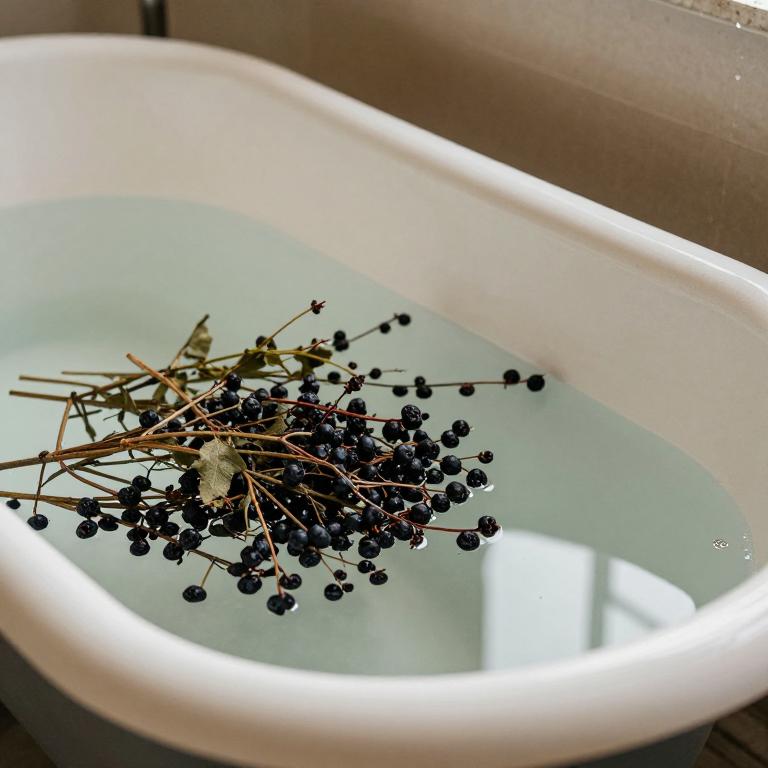
Sambucus nigra herbal baths are used to promote relaxation and ease muscle tension by leveraging the soothing properties of the elderflower.
The infusion of sambucus nigra leaves and flowers in bathwater can help reduce inflammation and alleviate symptoms of minor skin irritations. These baths are also beneficial for supporting the immune system, as they may help the body fight off colds and flu. Additionally, the aromatic compounds in sambucus nigra can enhance the sensory experience of bathing, creating a calming environment that reduces stress.
Due to its natural antiseptic and anti-inflammatory qualities, sambucus nigra is a popular choice for those seeking holistic wellness through traditional herbal remedies.
36. Valerian (Valeriana officinalis)
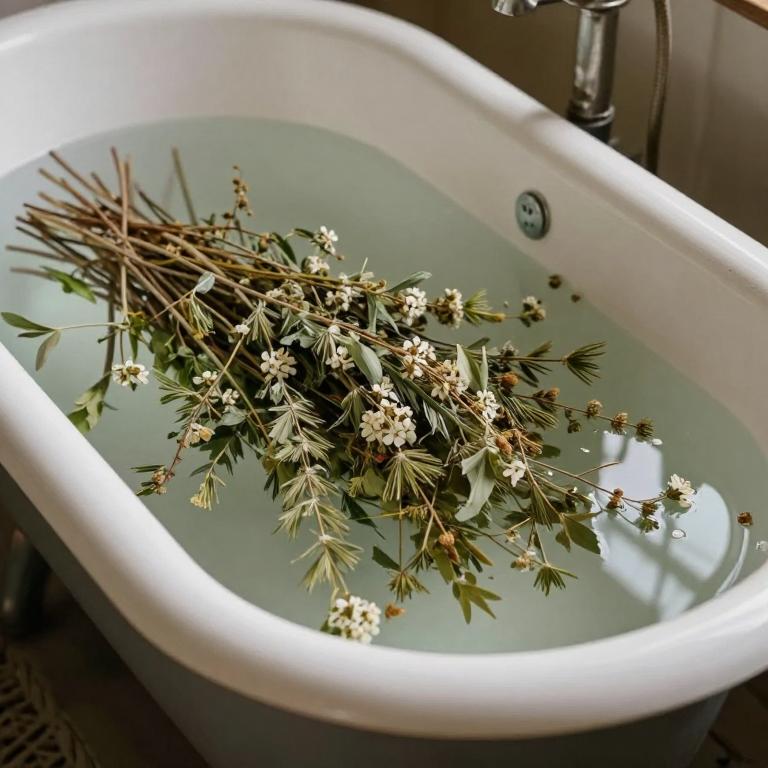
Valeriana officinalis herbal baths are used to promote relaxation and ease symptoms of anxiety and insomnia.
The active compounds in valerian root, such as valerenic acid and essential oils, have calming effects on the nervous system. These baths can help reduce stress and improve sleep quality by creating a soothing environment for the body and mind. They are also believed to alleviate muscle tension and headaches, making them beneficial for individuals experiencing stress-related ailments.
Due to their natural properties, valeriana officinalis herbal baths are a popular alternative therapy for those seeking holistic wellness solutions.
37. Common grape (Vitis vinifera)

Vitis vinifera herbal baths are used to promote relaxation and reduce stress by leveraging the soothing properties of grape-based ingredients.
These baths are known to enhance skin health due to the presence of antioxidants and minerals found in grape extracts. They can also aid in detoxification by helping the body eliminate toxins through the skin. Additionally, vitis vinifera baths are believed to alleviate symptoms of skin conditions such as eczema and psoriasis.
The use of these baths is rooted in traditional medicine and is increasingly supported by modern research on the therapeutic benefits of natural botanicals.
38. Lemon grass (Cymbopogon citratus)
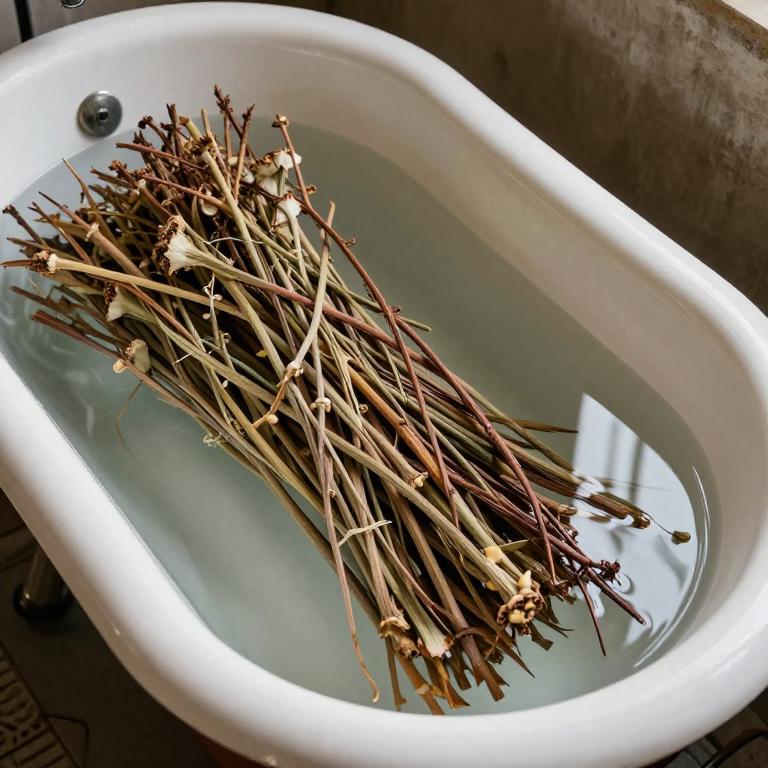
Cymbopogon citratus herbal baths are used to promote relaxation and alleviate stress by leveraging the calming properties of lemon grass essential oils.
These baths are also known to soothe muscle pain and reduce inflammation, making them beneficial for individuals suffering from arthritis or muscle strain. The aromatic compounds in lemon grass can enhance mental clarity and improve mood, offering a natural remedy for anxiety and depression. Additionally, cymbopogon citratus herbal baths are used to purify the skin and improve its overall health by detoxifying and balancing the skin's pH levels.
Their versatility and natural therapeutic benefits make them a popular choice in aromatherapy and holistic wellness practices.
39. Sanguisorba (Sanguisorba officinalis)

Sanguisorba officinalis herbal baths are used to promote skin health and alleviate inflammatory conditions due to their soothing and anti-inflammatory properties.
The plant contains compounds that help reduce redness, irritation, and discomfort associated with eczema, psoriasis, and other skin disorders. These baths are also believed to improve circulation and detoxify the skin by drawing out impurities and excess oils. The gentle nature of sanguisorba officinalis makes it suitable for sensitive skin, offering a natural alternative to chemical-based treatments.
Overall, these baths are valued for their calming effects and their ability to support holistic skincare practices.
40. Cumin (Cuminum cyminum)
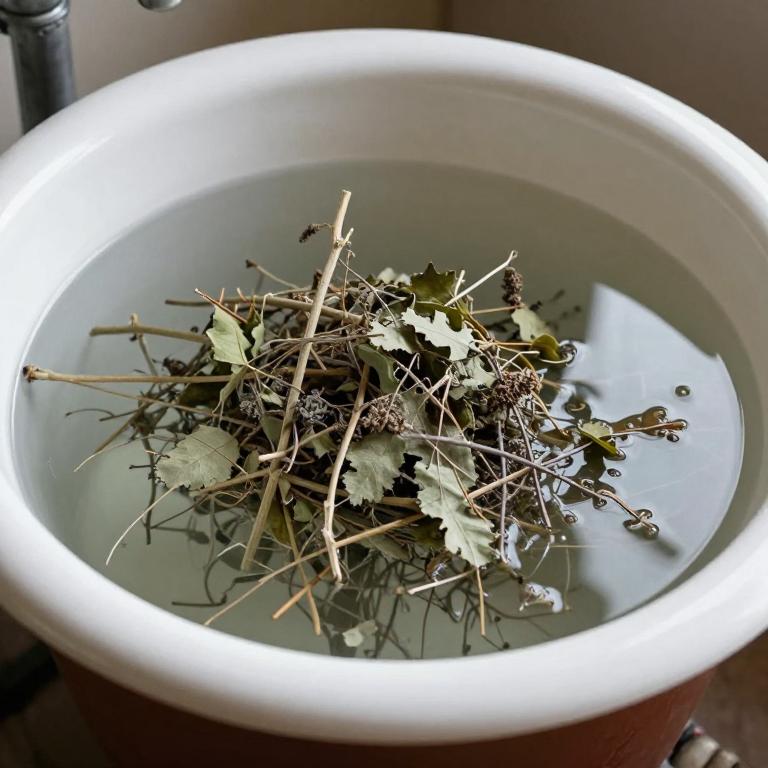
Cuminum cyminum herbal baths are used to promote relaxation and ease muscle tension by leveraging the calming properties of cumin seeds.
These baths are also beneficial for improving digestion, as the aromatic compounds in cumin can stimulate the digestive system and alleviate bloating. Additionally, cuminum cyminum herbal baths are known to have antimicrobial properties that help in cleansing the skin and preventing infections. They are often recommended for their ability to reduce stress and enhance overall well-being through aromatherapy.
The use of cumin in baths also supports respiratory health by helping to clear congestion and soothe the airways.
41. Aloe barbadensis
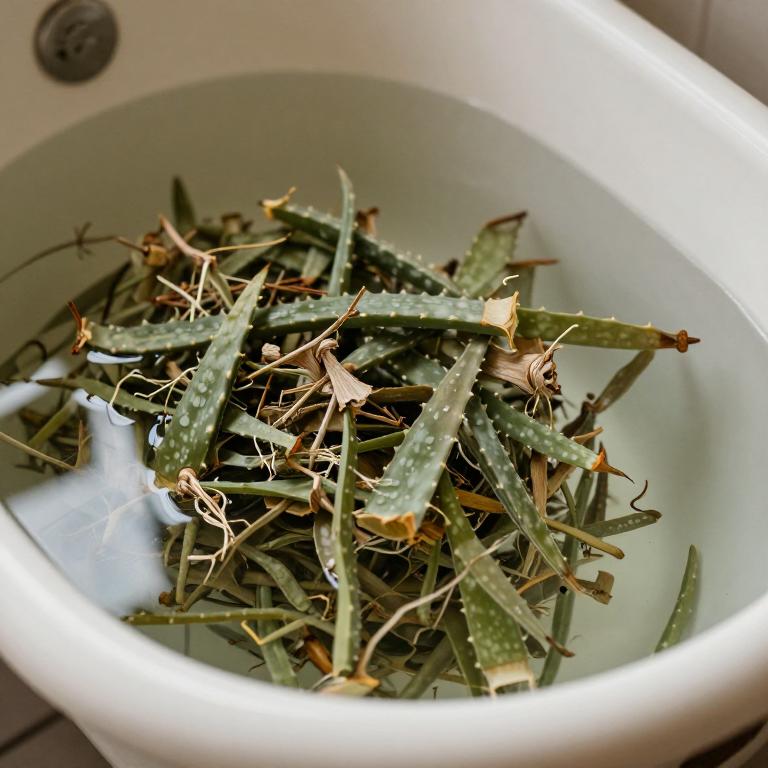
Aloe barbadensis herbal baths are used to soothe and rejuvenate the skin through their natural anti-inflammatory and moisturizing properties.
These baths can help alleviate symptoms of skin conditions such as eczema, psoriasis, and sunburn by reducing redness, itching, and irritation. The gel from the aloe plant also has antimicrobial qualities that can help prevent infections and promote healing of minor wounds. Additionally, aloe barbadensis baths are known to hydrate the skin deeply, leaving it soft and supple without the use of harsh chemicals.
Because of these benefits, they are a popular choice for those seeking natural, gentle skincare solutions.
42. Oregano (Origanum vulgare)
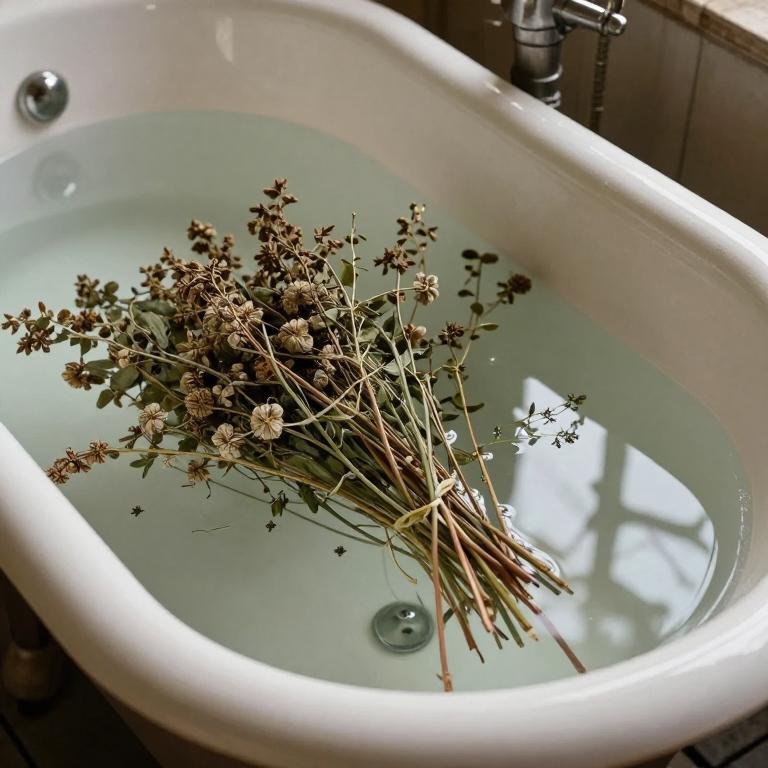
Origanum vulgare herbal baths are used to promote relaxation and alleviate symptoms of stress and anxiety.
The essential oils and compounds in oregano are known for their antiseptic and anti-inflammatory properties, making these baths beneficial for skin conditions such as eczema and acne. They can also help soothe muscle aches and joint pain due to their warming and stimulating effects. Additionally, the aromatic qualities of oregano can enhance mood and improve sleep quality when used in bath rituals.
Overall, origanum vulgare herbal baths offer a natural and holistic approach to wellness, combining therapeutic benefits with a pleasant sensory experience.
43. Wormwood (Artemisia absinthium)

Artemisia absinthium herbal baths are used to promote relaxation and alleviate symptoms of stress and anxiety.
The essential oils and compounds found in artemisia absinthium have calming properties that can soothe the nervous system, making these baths beneficial for mental well-being. Additionally, they are believed to support skin health by reducing inflammation and promoting a sense of cleanliness. Some traditional practices also suggest that artemisia absinthium baths may help with digestive issues when used in conjunction with other herbs.
Overall, the use of artemisia absinthium in herbal baths combines historical tradition with potential therapeutic benefits for both the mind and body.
44. Marigold (Calendula officinalis)

Calendula officinalis herbal baths are used to promote skin health and soothe various skin conditions.
The anti-inflammatory and antimicrobial properties of calendula make it effective in reducing redness, irritation, and infection in the skin. These baths are particularly beneficial for individuals with eczema, psoriasis, or minor burns due to their soothing and healing effects. The gentle nature of calendula makes it suitable for sensitive skin, offering a natural alternative to harsh chemical treatments.
Overall, calendula officinalis herbal baths provide a safe and effective way to enhance skin wellness and comfort.
45. Purple coneflower (Echinacea angustifolia)
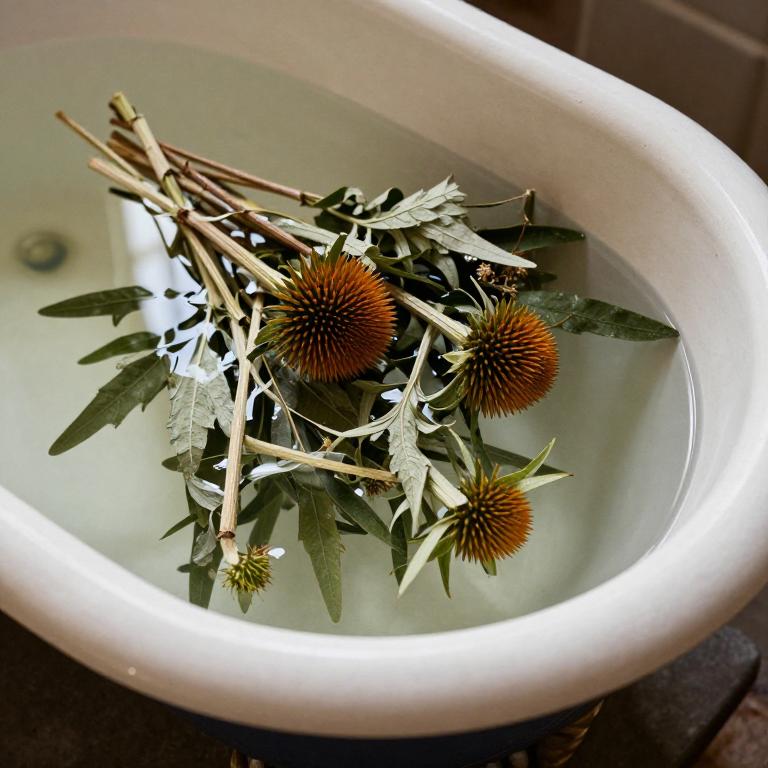
Echinacea angustifolia herbal baths are used to support immune health and promote skin wellness through their anti-inflammatory and antimicrobial properties.
The active compounds in echinacea, such as alkamides and polysaccharides, help stimulate the body's natural defenses and reduce the risk of infections. These baths can also soothe skin irritations, redness, and minor wounds by providing a calming and healing effect. Additionally, the aromatic properties of echinacea may contribute to relaxation and stress relief, enhancing overall well-being.
For those seeking natural remedies, echinacea angustifolia herbal baths offer a holistic approach to improving both physical and mental health.
46. Mountain arnica (Arnica montana)
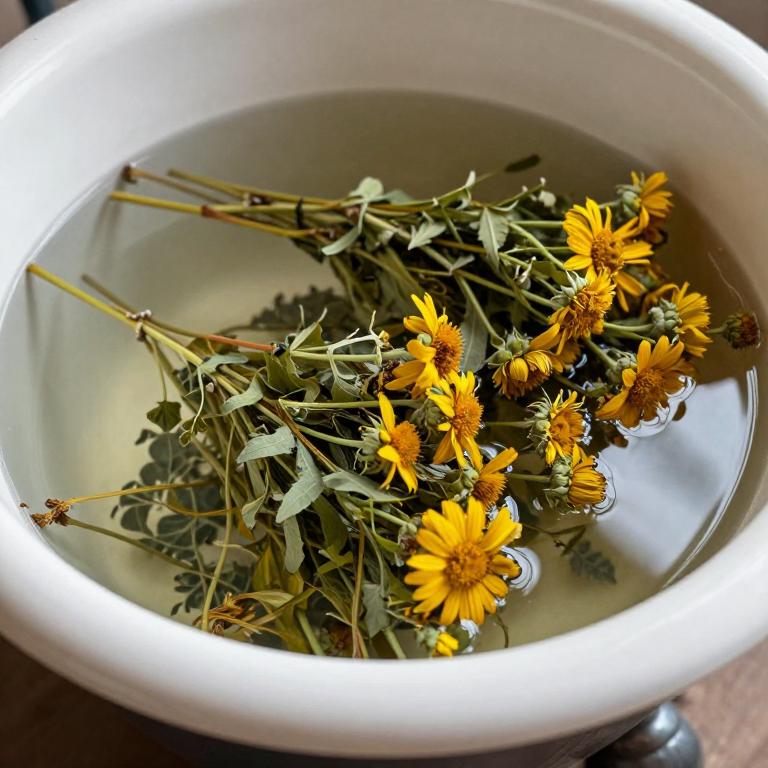
Arnica montana herbal baths are used to promote healing and reduce inflammation in musculoskeletal injuries.
The active compounds in arnica, such as helenalin and other sesquiterpene lactones, have anti-inflammatory and analgesic properties that help alleviate pain and swelling. These baths are commonly used for conditions like sprains, bruises, and arthritis to support tissue repair and ease discomfort. The warm water enhances the absorption of arnica's beneficial compounds through the skin, making it an effective topical treatment.
Due to its natural and soothing properties, arnica montana herbal baths are a popular choice for those seeking alternative or complementary therapy for muscle and joint issues.
47. Greek oregano (Satureja hortensis)
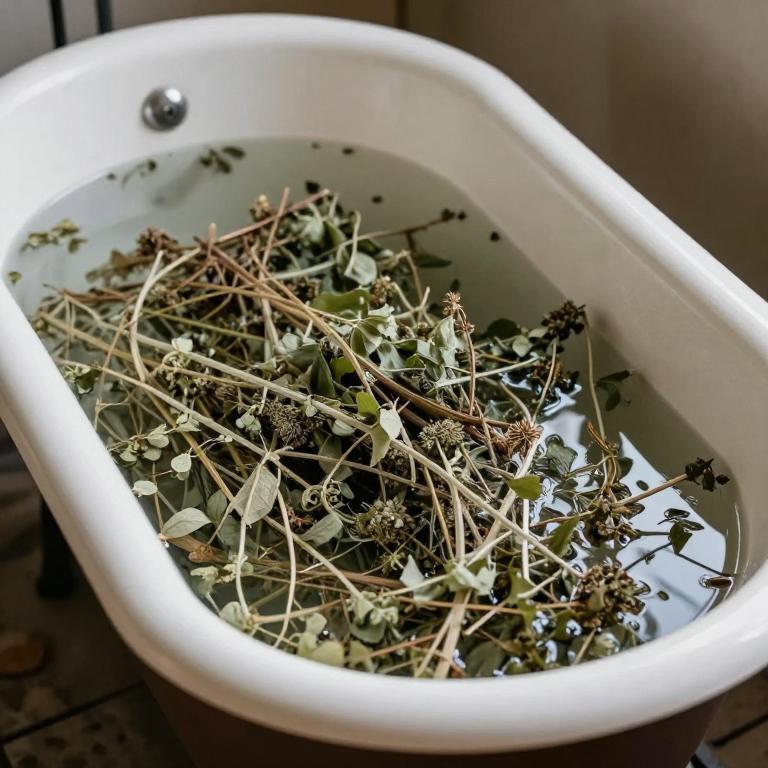
Satureja hortensis herbal baths are used to promote relaxation and ease muscle tension through their soothing aromatic properties.
The essential oils derived from this herb have calming effects that can help reduce stress and anxiety, making these baths ideal for mental and emotional well-being. Additionally, the anti-inflammatory and antiseptic qualities of satureja hortensis make it beneficial for skin health, helping to soothe irritations and improve circulation. These baths are also known to support respiratory health by clearing the airways and easing breathing, particularly during cold seasons.
Overall, the use of satureja hortensis in herbal baths offers a natural and holistic approach to enhancing both physical and psychological wellness.
48. Soaproot (Saponaria officinalis)
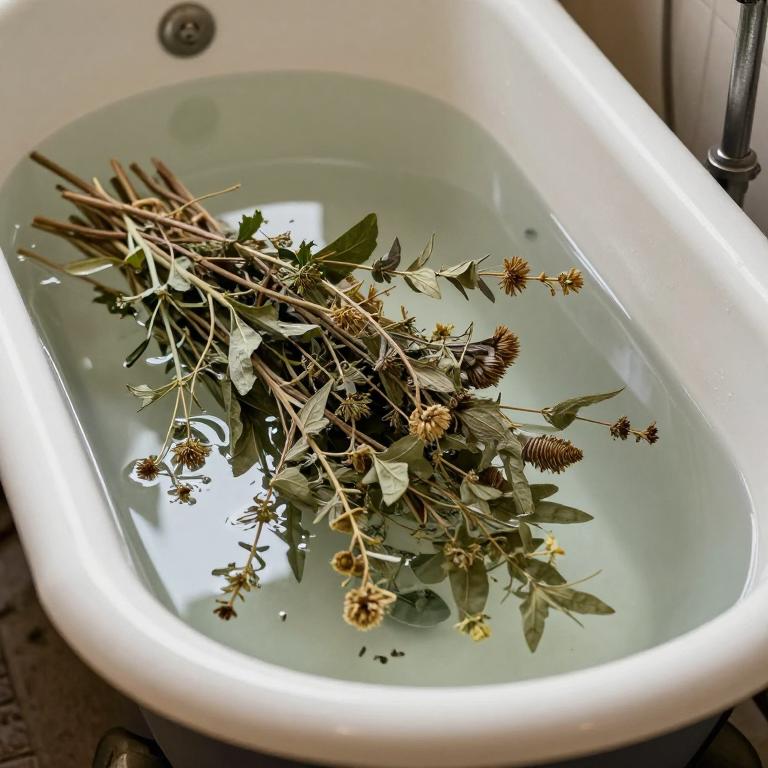
Saponaria officinalis herbal baths are used to promote skin health and relaxation through their mild cleansing and soothing properties.
The plant contains saponins, which help to gently exfoliate the skin and remove impurities without causing irritation. These baths are also known to reduce inflammation and alleviate symptoms of skin conditions such as eczema and psoriasis. The calming aroma of saponaria officinalis can help ease stress and improve overall well-being.
Due to its natural and gentle nature, it is a popular choice for those seeking a soothing, therapeutic bath experience.
49. White cedar (Thuja occidentalis)

Thuja occidentalis herbal baths are used to promote skin health and detoxification by leveraging the plant's antimicrobial and anti-inflammatory properties.
These baths help in reducing skin conditions such as eczema, psoriasis, and fungal infections due to the presence of compounds like alpha-pinene and sabinene. The aromatic compounds in thuja also have a calming effect, making the baths beneficial for stress relief and relaxation. Additionally, they are believed to support the body's natural healing processes by enhancing circulation and lymphatic drainage.
Overall, thuja occidentalis herbal baths offer a holistic approach to wellness, combining therapeutic benefits with a soothing sensory experience.
50. Plantain (Plantago lanceolata)
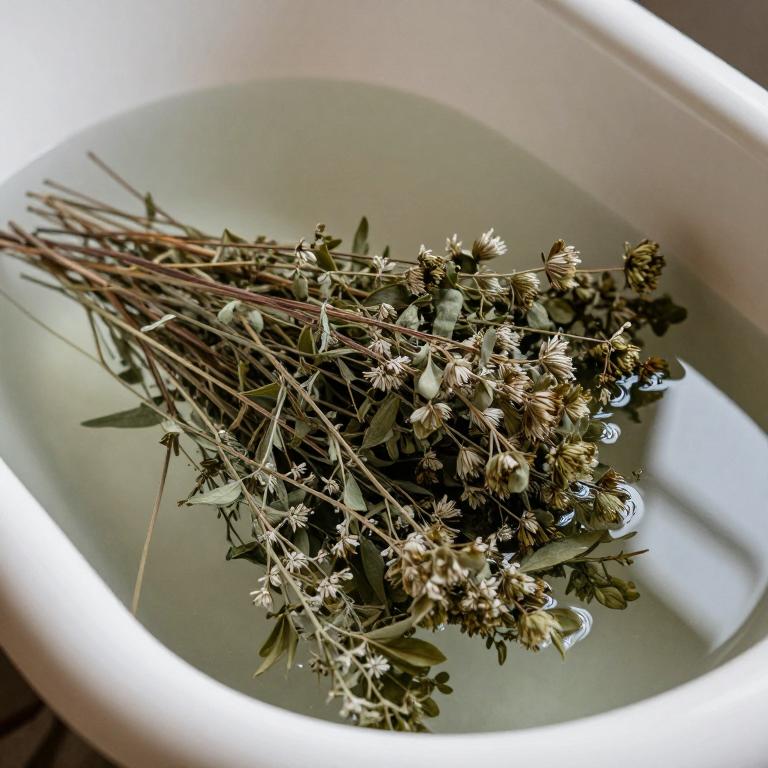
Plantago lanceolata herbal baths are used to promote skin health and relieve irritation due to their anti-inflammatory and soothing properties.
The plant contains mucilage, which forms a protective layer on the skin, helping to reduce redness and discomfort. These baths are particularly beneficial for individuals suffering from eczema, psoriasis, or other dermatological conditions. The natural compounds in Plantago lanceolata also have mild antiseptic qualities, making them useful for treating minor skin infections.
Overall, these baths offer a gentle, natural alternative for maintaining healthy skin and alleviating various skin-related issues.
51. Kudzu (Pueraria lobata)

Pueraria lobata herbal baths are used to promote relaxation and alleviate symptoms of stress and anxiety.
The plant, also known as kudzu, contains compounds that may help reduce inflammation and soothe the nervous system. These baths are often recommended for individuals seeking natural remedies to improve skin health and reduce muscle tension. The soothing properties of pueraria lobata make it a popular choice in traditional Chinese medicine for its calming and therapeutic effects.
Overall, these baths offer a holistic approach to wellness by combining the benefits of herbal treatment with the relaxing effects of a warm soak.
52. Lemon grass (Cymbopogon martini)
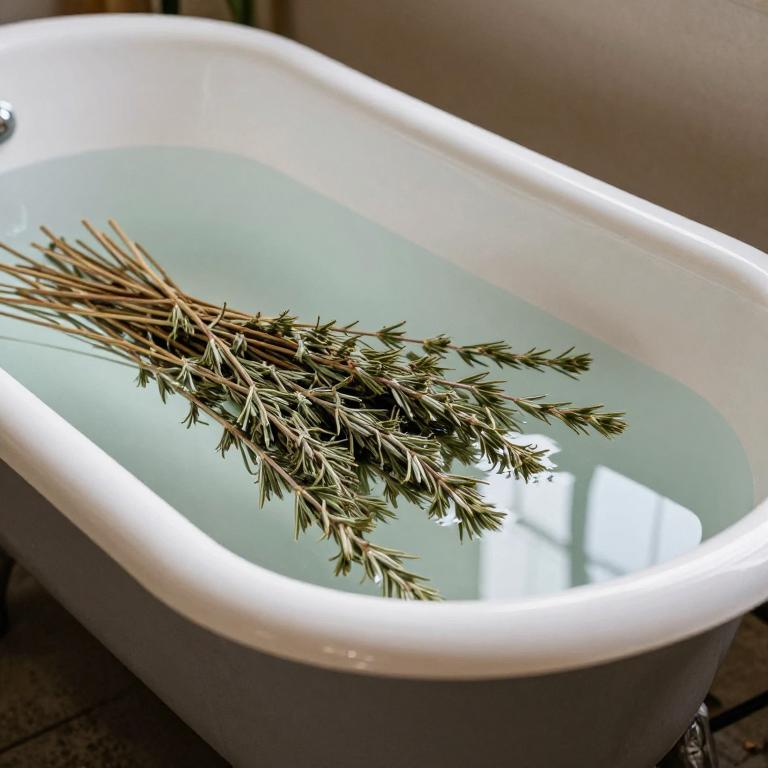
Cymbopogon martini herbal baths are used to promote relaxation and relieve stress by leveraging the calming properties of the plant's essential oils.
These baths are particularly beneficial for individuals suffering from anxiety or insomnia, as the aromatic compounds in the herb can help soothe the nervous system. The therapeutic effects of cymbopogon martini are also attributed to its ability to improve circulation and reduce muscle tension, making it ideal for those experiencing physical discomfort or fatigue. Additionally, the herb's natural antiseptic properties make it useful in treating skin conditions and preventing infections when used in bath water.
Overall, cymbopogon martini herbal baths offer a holistic approach to wellness, combining aromatherapy with natural healing to enhance both mental and physical well-being.
53. Common plantain (Plantago major)
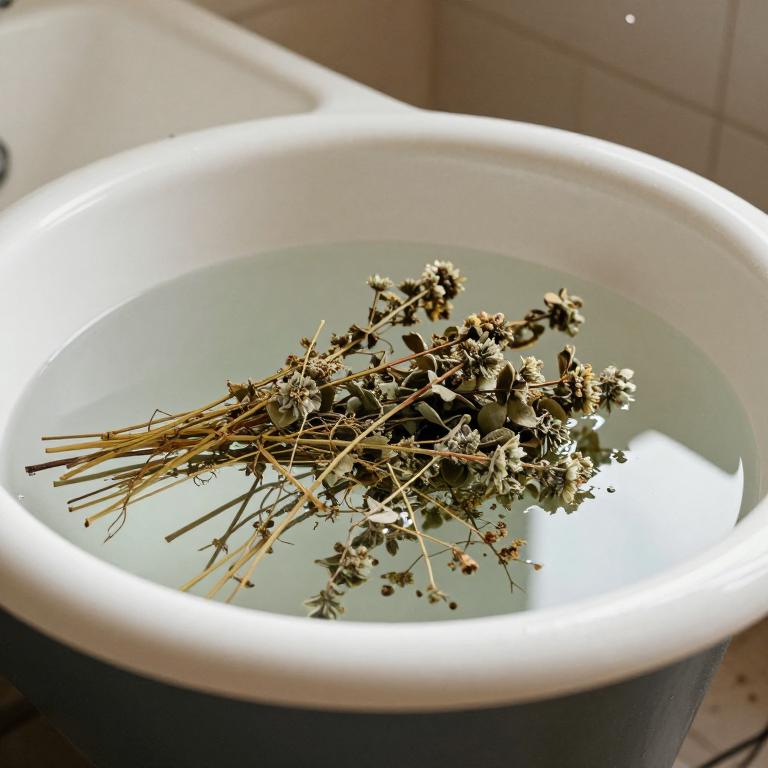
Plantago major herbal baths are used to soothe and heal various skin conditions due to their anti-inflammatory and antimicrobial properties.
These baths can help alleviate symptoms of eczema, psoriasis, and minor skin irritations by reducing redness and itching. The presence of allantoin in plantago major promotes skin cell regeneration, aiding in the healing process. Additionally, the cooling effect of the herbal infusion can provide relief from insect bites and minor burns.
Overall, plantago major herbal baths are a natural and effective remedy for maintaining skin health and comfort.
54. Ginkgo (Ginkgo biloba)
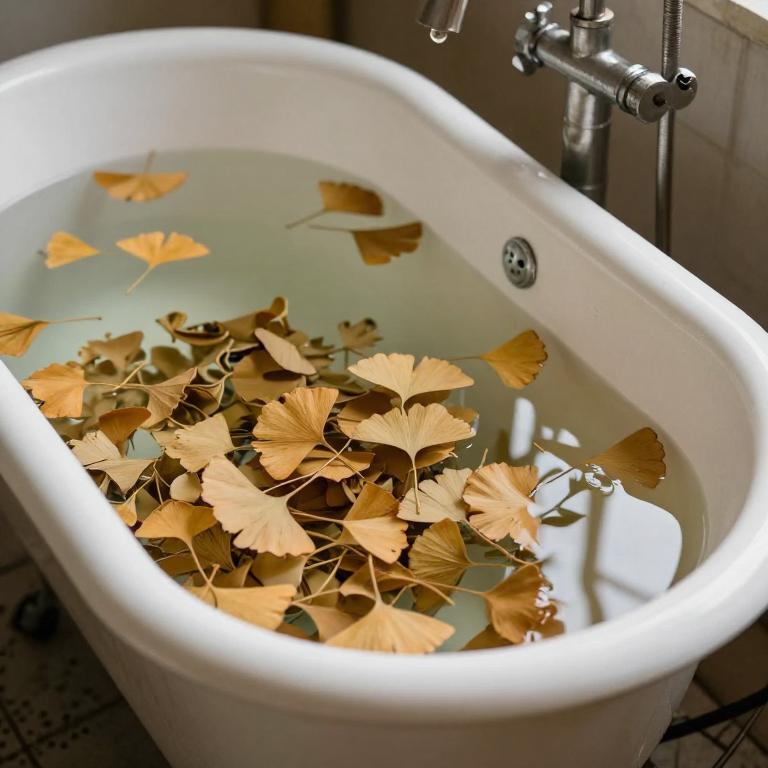
Ginkgo biloba herbal baths are used to promote relaxation and reduce stress by leveraging the calming properties of the ginkgo biloba leaves.
These baths are believed to enhance blood circulation, which can help alleviate symptoms of fatigue and improve overall well-being. The essential oils and extracts from ginkgo biloba are known for their antioxidant and anti-inflammatory effects, which may support skin health and reduce irritation. Additionally, the aromatic qualities of ginkgo biloba can stimulate the senses and create a soothing atmosphere, making these baths ideal for meditation or restful sleep.
Overall, ginkgo biloba herbal baths offer a natural and holistic approach to wellness by combining therapeutic benefits with a calming sensory experience.
55. Catnip (Nepeta cataria)
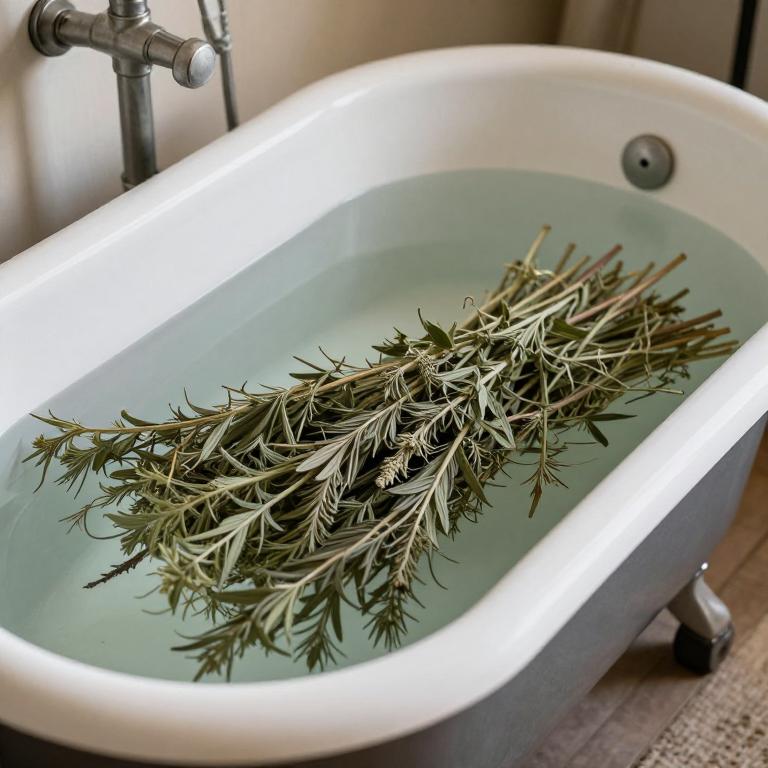
Nepeta cataria herbal baths are used to promote relaxation and ease symptoms of anxiety and stress.
The plant, commonly known as catnip, contains compounds that have mild sedative properties, which can help calm the nervous system. These baths are also believed to improve sleep quality by creating a soothing environment that encourages restful sleep. Additionally, the aromatic properties of nepeta cataria can have a calming effect on the mind and body, making it a popular choice for aromatherapy.
Overall, nepeta cataria herbal baths offer a natural and soothing way to support mental and emotional well-being.
56. Black cumin (Nigella sativa)
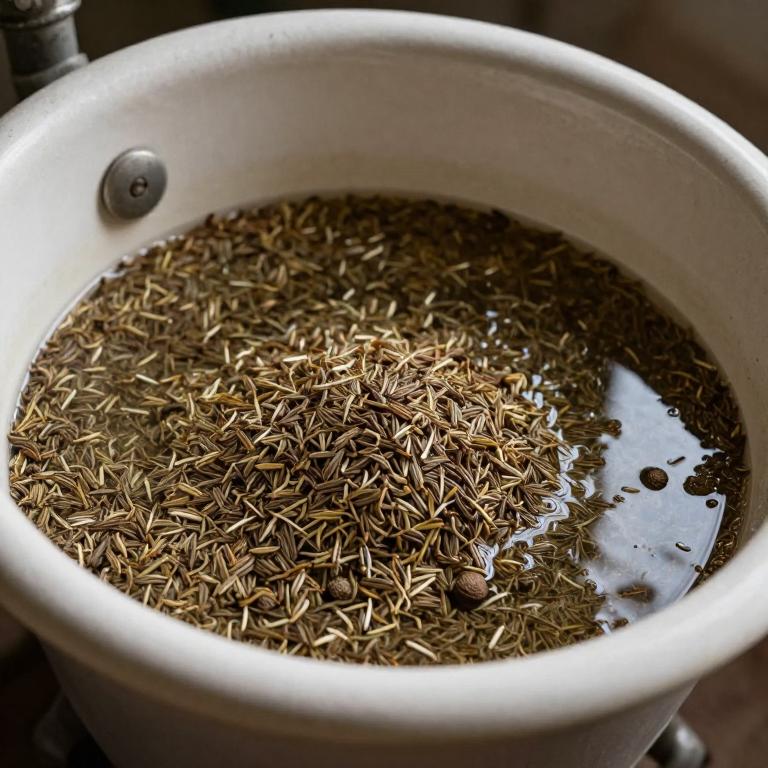
Nigella sativa herbal baths are used to promote skin health and alleviate various skin conditions due to their anti-inflammatory and antimicrobial properties.
The essential oil of black cumin, derived from Nigella sativa, can help reduce redness, itching, and irritation when infused into bathwater. These baths are also believed to detoxify the skin, improve circulation, and enhance overall well-being through their aromatic and therapeutic effects. Additionally, the warming properties of the bath can help soothe muscle aches and relieve stress, making it a holistic remedy for both physical and mental relaxation.
Regular use of nigella sativa herbal baths may contribute to a more radiant and healthier complexion.
57. Geranium (Pelargonium graveolens)

Pelargonium graveolens herbal baths are used to promote relaxation and alleviate stress by harnessing the calming properties of its essential oils.
The plant, commonly known as geranium, contains compounds that have soothing effects on the skin and mind, making these baths ideal for reducing anxiety and improving mood. Additionally, pelargonium graveolens baths can help in relieving muscle tension and soreness due to their anti-inflammatory and analgesic properties. These baths are also believed to support skin health by balancing oil production and reducing irritations.
Overall, the use of pelargonium graveolens in herbal baths offers a natural and holistic approach to wellness, combining aromatherapy with therapeutic benefits.
58. Marshmallow (Althaea officinalis)
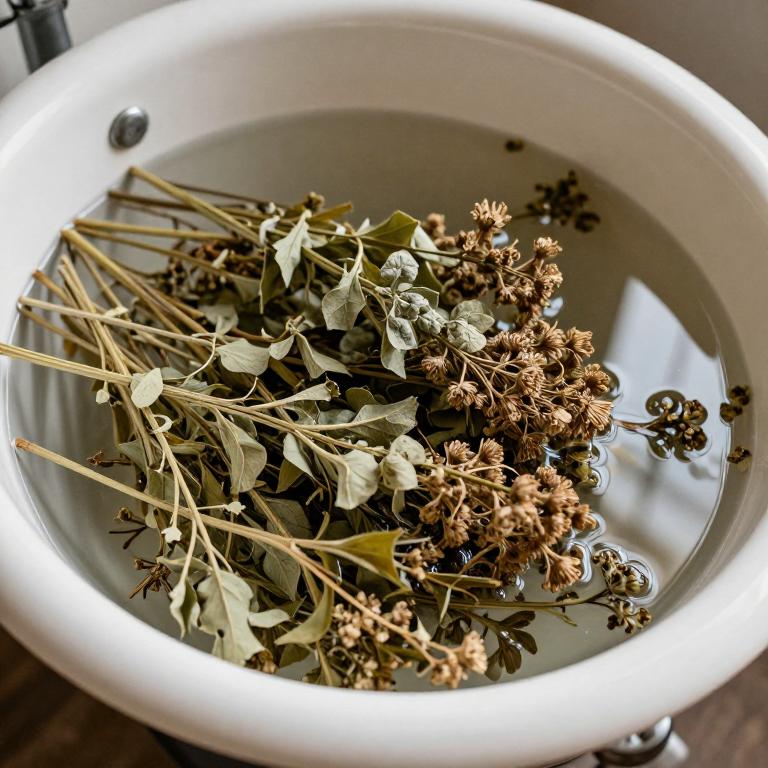
Althaea officinalis herbal baths are used to soothe and nourish the skin, particularly for those suffering from dryness, eczema, or irritation.
The plant, commonly known as marshmallow root, contains mucilage that forms a protective layer on the skin, helping to retain moisture and reduce inflammation. These baths are also beneficial for alleviating symptoms of minor burns or wounds due to their anti-inflammatory and soothing properties. Additionally, althaea officinalis is believed to support respiratory health when used in baths, as it may help ease congestion and promote relaxation.
Overall, the use of althaea officinalis herbal baths is rooted in its ability to provide gentle, natural relief for a variety of skin and respiratory conditions.
59. Pumpkin (Cucurbita pepo)
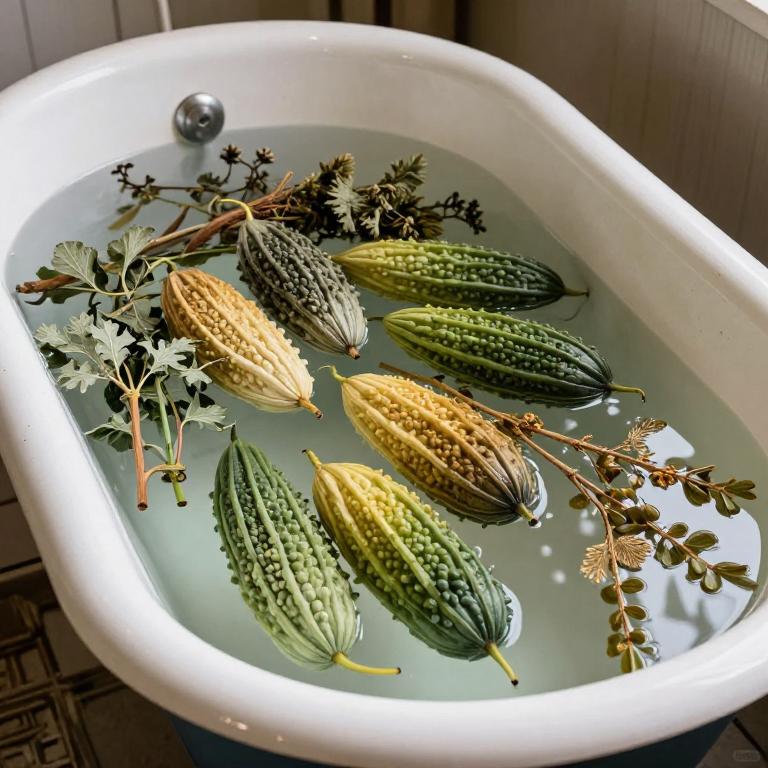
Cucurbita pepo herbal baths are used to promote skin health and relieve minor skin irritations due to their anti-inflammatory and soothing properties.
These baths can help reduce redness, itching, and inflammation associated with conditions like eczema or psoriasis. The natural compounds in cucurbita pepo, such as cucurbitacin and various antioxidants, contribute to its healing effects on the skin. Additionally, these baths are believed to enhance relaxation and reduce stress, making them a beneficial addition to wellness routines.
Their gentle nature makes them suitable for use by a wide range of individuals seeking natural remedies for skin care.
60. Melaleuca (Melaleuca alternifolia)
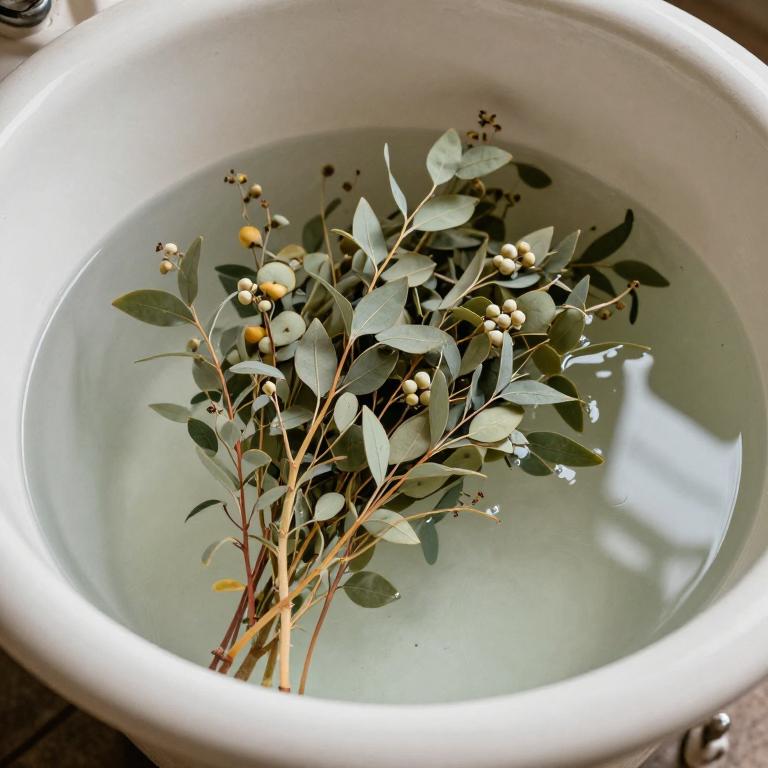
Melaleuca alternifolia herbal baths are used to promote skin health and provide natural relief for various skin conditions.
The essential oil derived from the leaves of this plant contains potent antimicrobial and anti-inflammatory properties, making it effective in treating infections and reducing redness. These baths can also help soothe irritated skin, reduce itching, and accelerate the healing of minor wounds or abrasions. Additionally, the aromatic properties of melaleuca alternifolia may contribute to a calming effect, enhancing overall well-being during the bathing process.
Due to its natural and holistic benefits, melaleuca alternifolia herbal baths are increasingly favored as a complementary therapy in skincare routines.
61. Spiraea ulmaria

Spiraea ulmaria herbal baths are used to promote skin health and alleviate inflammatory conditions such as eczema and psoriasis.
The plant contains compounds with anti-inflammatory and antimicrobial properties that help reduce redness, itching, and infection risks. These baths are also believed to soothe muscle aches and joint pain, making them beneficial for individuals with arthritis or muscle strain. The gentle nature of spiraea ulmaria makes it suitable for sensitive skin, offering a natural and calming alternative to chemical-based treatments.
Overall, its therapeutic effects make spiraea ulmaria a valuable ingredient in traditional and modern herbal medicine practices.
62. Sacred lotus (Nelumbo nucifera)
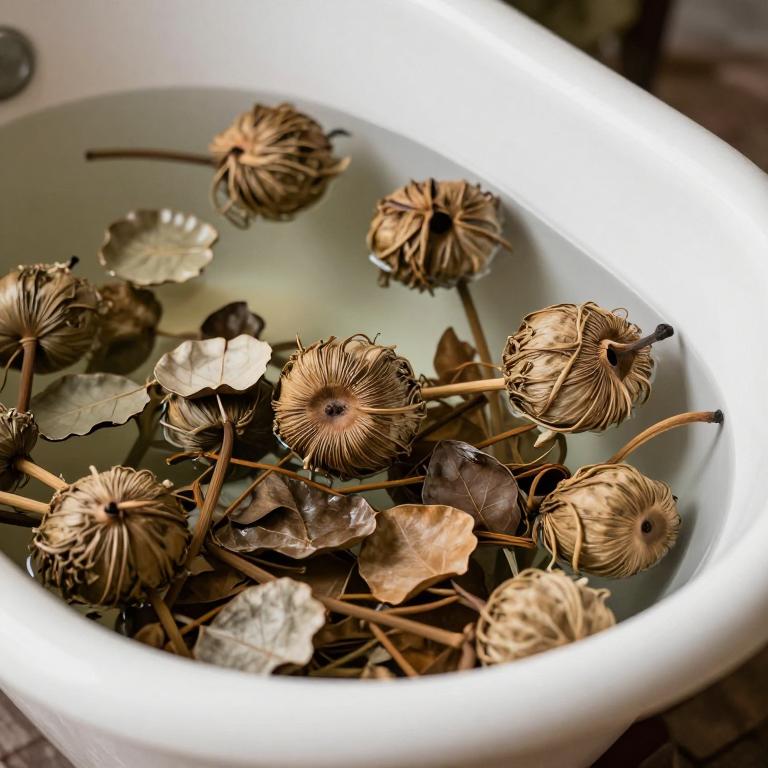
Nelumbo nucifera herbal baths are used to promote relaxation and enhance skin health through their soothing and nourishing properties.
The plant, commonly known as the sacred lotus, contains natural compounds that help in reducing inflammation and calming the mind, making these baths ideal for stress relief. Additionally, the herbal infusion from the lotus flowers and leaves can help cleanse the skin, improve circulation, and alleviate symptoms of skin conditions such as eczema and psoriasis. The aromatic properties of the herbs also contribute to a sense of well-being and mental clarity, supporting overall wellness.
Due to their holistic benefits, nelumbo nucifera herbal baths are increasingly popular in traditional medicine and modern wellness practices alike.
63. Sandalwood (Santalum album)
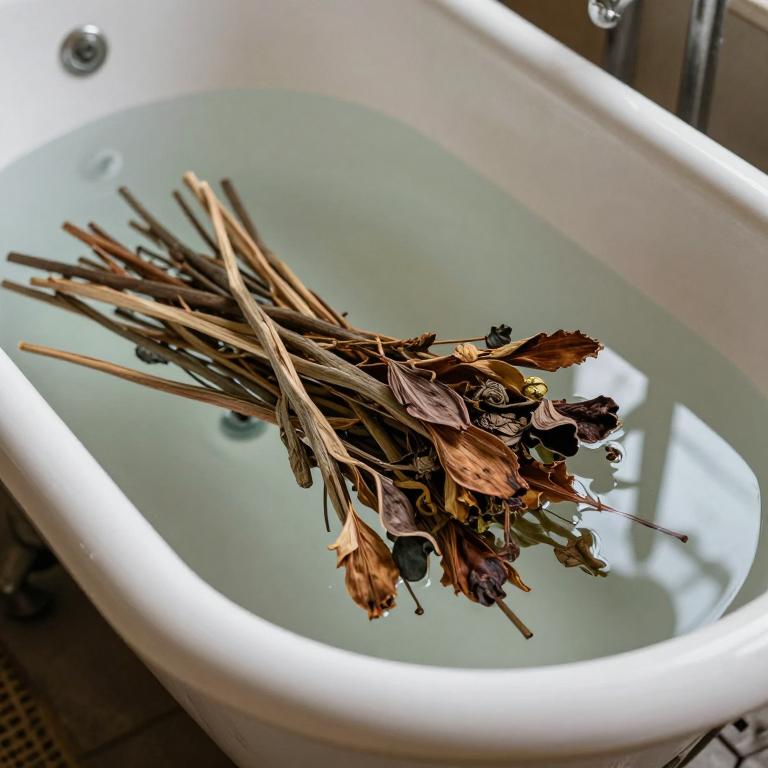
Santalum album herbal baths are used to promote relaxation and ease muscle tension through their calming and soothing properties.
The essential oils derived from this plant are known for their ability to reduce stress and anxiety, making these baths ideal for mental and emotional well-being. They are also believed to improve skin health by nourishing and moisturizing the skin with their rich fatty acids and antioxidants. The aromatic compounds in santalum album can enhance the sensory experience of bathing, creating a spa-like atmosphere that encourages relaxation.
Due to these benefits, santalum album herbal baths are increasingly popular in aromatherapy and holistic wellness practices.
64. Citrus sinensis

Citrus sinensis herbal baths are used to promote relaxation and alleviate stress by releasing the soothing properties of the fruit's essential oils into the water.
These baths are also known to improve skin health due to the high concentration of antioxidants and vitamins present in the citrus peel, which help in reducing inflammation and promoting a radiant complexion. Additionally, citrus sinensis herbal baths can aid in detoxification by stimulating the lymphatic system and encouraging the body's natural cleansing processes. The pleasant aroma of the citrus scent also has a calming effect, enhancing mental clarity and reducing feelings of anxiety.
Overall, these baths offer a holistic approach to wellness by combining physical, mental, and emotional benefits.
65. Garlic (Allium sativum)
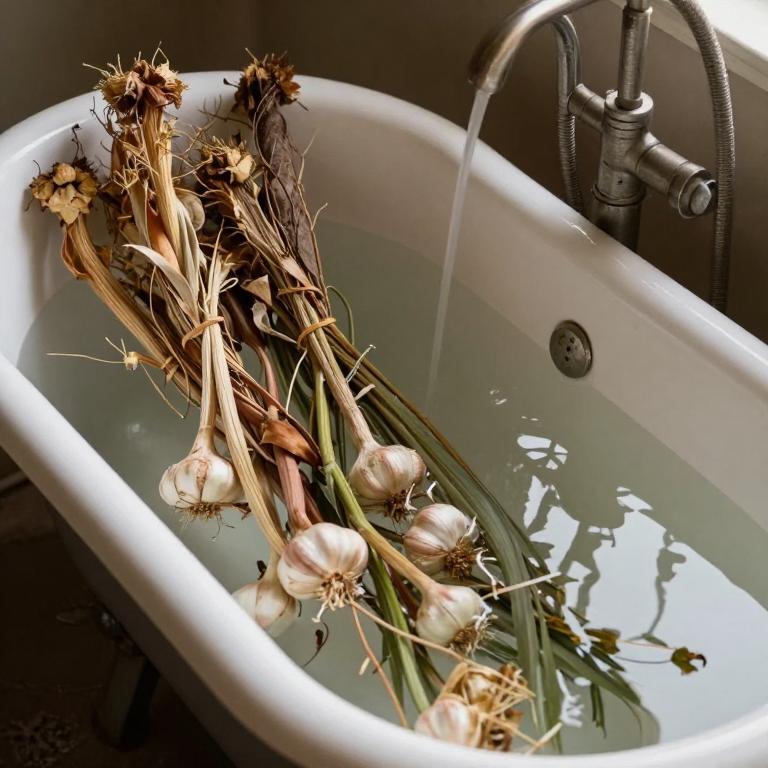
Allium sativum herbal baths are used to promote relaxation and ease muscle tension by leveraging the soothing properties of garlic.
The compounds in garlic, such as allicin, have antimicrobial and anti-inflammatory effects that can help cleanse the skin and reduce irritation. These baths are also believed to improve circulation, which can alleviate symptoms of conditions like arthritis and chronic fatigue. Additionally, the aromatic compounds in garlic may have a calming effect on the mind, aiding in stress relief and better sleep.
Overall, allium sativum herbal baths offer a holistic approach to wellness by combining therapeutic benefits for both the body and mind.
66. Hemp (Cannabis sativa)
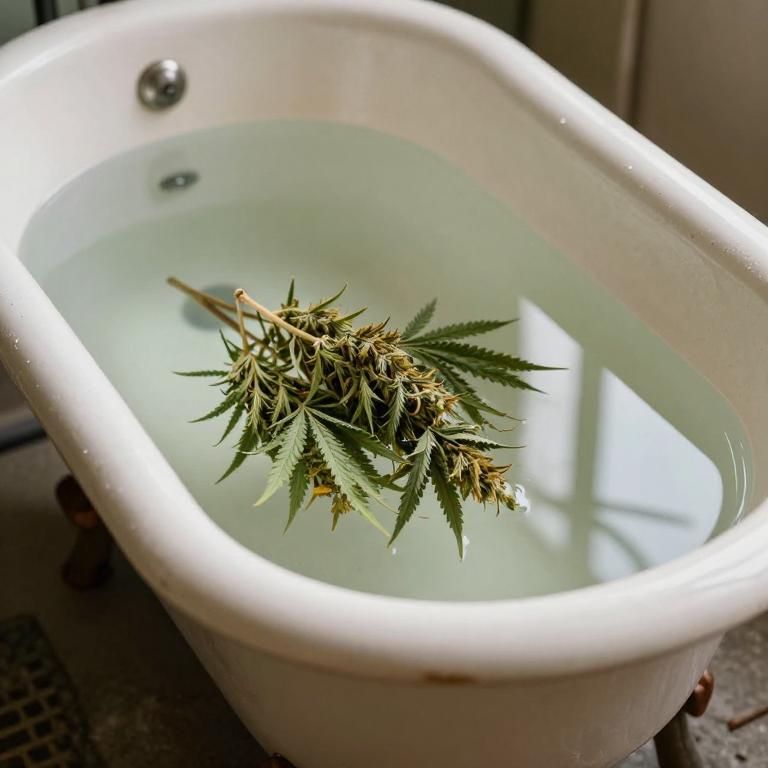
Cannabis sativa herbal baths are used to promote relaxation and alleviate muscle tension by incorporating CBD-infused products into warm water.
These baths can help reduce inflammation and soothe sore muscles, making them beneficial for individuals with chronic pain or athletic recovery. The calming effects of cannabis sativa may also aid in reducing anxiety and improving sleep quality, offering a holistic approach to mental well-being. Additionally, the aromatic properties of cannabis can enhance the sensory experience of bathing, creating a spa-like environment at home.
Overall, cannabis sativa herbal baths are gaining popularity as a natural remedy for both physical and emotional wellness.
67. Poppy (Papaver rhoeas)
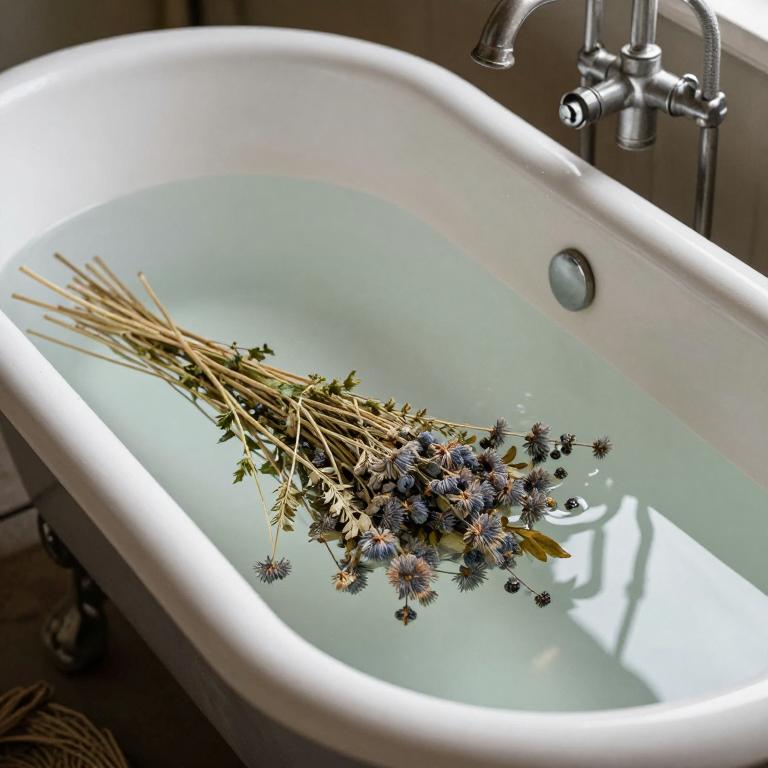
Papaver rhoeas herbal baths are used to promote relaxation and soothe skin irritations due to their calming and anti-inflammatory properties.
The flowers contain compounds that may help reduce stress and ease muscle tension, making these baths ideal for stress relief and improving sleep quality. They are also believed to have mild antiseptic qualities, which can aid in the healing of minor skin conditions such as eczema or psoriasis. Additionally, the gentle scent of papaver rhoeas can enhance the overall bathing experience, creating a sense of tranquility and well-being.
These baths are particularly favored in aromatherapy and holistic medicine for their natural, soothing effects on both the body and mind.
68. St. john's wort (Agrimonia eupatoria)

Agrimonia eupatoria herbal baths are used to promote skin health and alleviate inflammatory conditions due to their anti-inflammatory and astringent properties.
The plant contains tannins and flavonoids, which help reduce redness, irritation, and bacterial infections when used topically. These baths are particularly beneficial for individuals suffering from eczema, psoriasis, or minor skin infections. The soothing effects of agrimonia eupatoria can also help relieve stress and improve overall well-being.
Because of its natural healing properties, it is a popular choice in traditional medicine for supporting skin and immune health.
69. Poison ivy (Rhus toxicodendron)
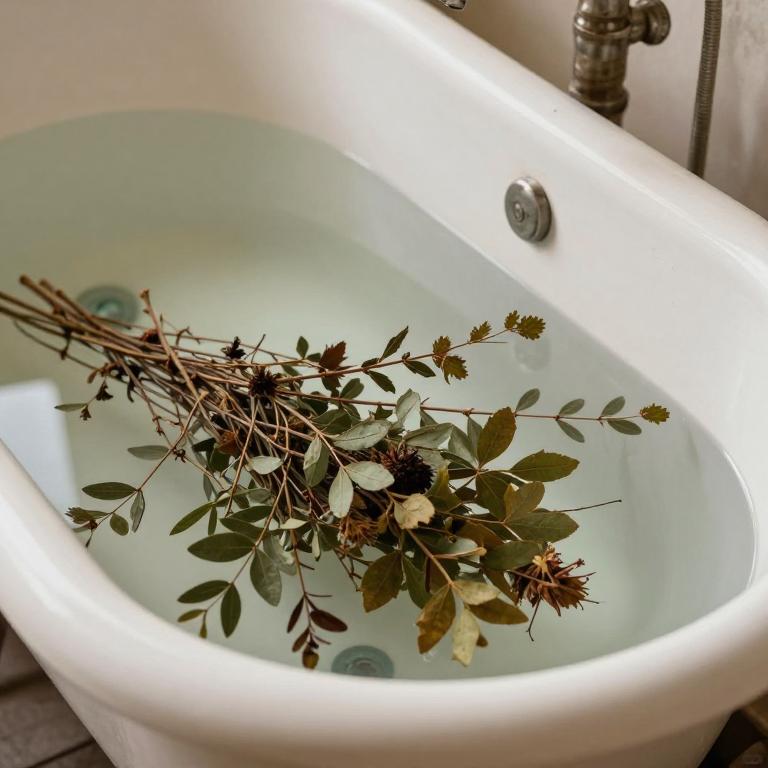
Rhus toxicodendron herbal baths are used to alleviate symptoms of skin conditions such as eczema, psoriasis, and dermatitis by reducing inflammation and itching.
The active compounds in Rhus toxicodendron, also known as poison ivy, have antihistaminic and anti-inflammatory properties that help soothe irritated skin. These baths are particularly beneficial for individuals experiencing allergic reactions or contact dermatitis, as they provide a natural and calming remedy. The soothing effects of the bath can also promote relaxation and reduce stress, which may exacerbate skin conditions.
Overall, Rhus toxicodendron herbal baths are a valuable alternative therapy for those seeking natural relief from skin irritation and inflammation.
70. Smooth sumac (Rhus typhina)

Rhus typhina herbal baths are used to soothe skin irritation and promote relaxation.
This herb, commonly known as sumac, contains compounds that have anti-inflammatory and antiseptic properties, making it effective for treating conditions like eczema and psoriasis. The warm water combined with the herbal infusion helps to open pores and enhance the absorption of beneficial nutrients into the skin. Additionally, these baths are believed to aid in reducing joint pain and muscle tension, offering relief for those suffering from arthritis or chronic inflammation.
Overall, rhus typhina herbal baths are valued for their natural healing properties and ability to provide both physical and emotional well-being.
71. Common peony (Paeonia officinalis)

Paeonia officinalis herbal baths are used to promote relaxation and ease muscle tension by leveraging the calming properties of the plant's root.
These baths are particularly beneficial for individuals suffering from stress-related conditions or chronic fatigue, as the active compounds in paeonia officinalis may help soothe the nervous system. The anti-inflammatory and analgesic effects of the herb can also aid in reducing pain and swelling in muscles and joints, making it a popular choice for those with arthritis or other inflammatory disorders. Additionally, the aromatic qualities of paeonia officinalis contribute to a sense of well-being, enhancing the overall therapeutic experience of the bath.
Due to its multifaceted benefits, paeonia officinalis herbal baths are increasingly recognized as a natural remedy for both physical and mental health.
72. Mock orange (Syringa vulgaris)

Syringa vulgaris herbal baths are used to promote relaxation and alleviate stress-related ailments.
The plant, commonly known as lilac, contains essential oils and phytochemicals that have soothing and calming properties. These baths are often recommended for individuals suffering from anxiety, insomnia, or muscle tension due to their ability to ease mental and physical strain. The aromatic compounds in syringa vulgaris can also enhance mood and create a serene environment for therapeutic purposes.
Overall, syringa vulgaris herbal baths offer a natural and effective way to support emotional well-being and physical recovery.
73. Nux vomica (Strychnos nux-vomica)
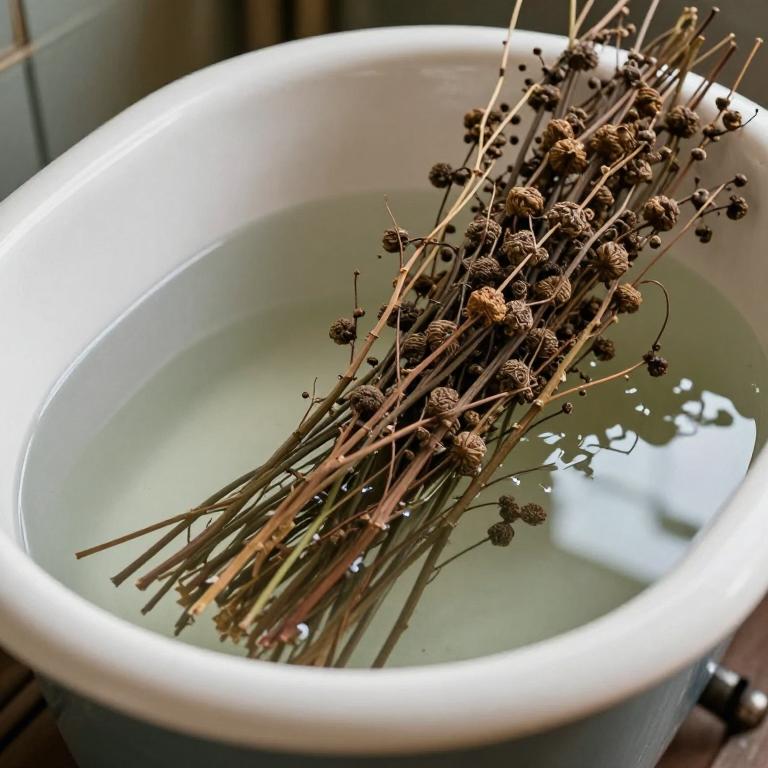
Strychnos nux-vomica herbal baths are used to promote relaxation and alleviate muscle tension through the soothing properties of the plant's extracts.
These baths are believed to help reduce stress and anxiety by stimulating the nervous system in a balanced manner, which can lead to a calming effect on the body. The herbal compounds in the bath may also improve circulation, helping to ease discomfort in the joints and muscles. Additionally, they are sometimes used to support detoxification processes and enhance overall well-being.
However, due to the potential toxicity of the plant, it is crucial to use these baths under professional guidance to ensure safety and effectiveness.
74. Chinese peony (Paeonia lactiflora)
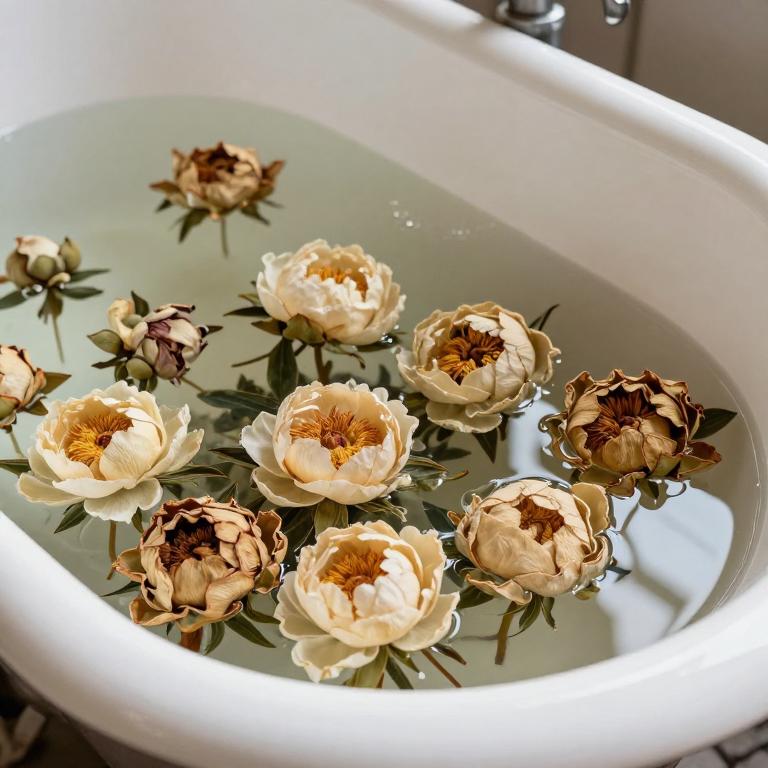
Paeonia lactiflora herbal baths are used to promote relaxation and ease muscle tension through their soothing properties.
The plant, known for its calming effects, helps reduce stress and anxiety when its extracts are infused into bath water. These baths are also beneficial for improving skin health by nourishing and moisturizing the skin with its natural compounds. The anti-inflammatory properties of paeonia lactiflora can help alleviate symptoms of skin irritations and inflammatory conditions.
Overall, incorporating paeonia lactiflora into herbal baths offers a holistic approach to wellness by combining physical comfort with emotional well-being.
75. Potato (Solanum tuberosum)

Solanum tuberosum herbal baths are used to promote relaxation and ease muscle tension through the soothing properties of its leaves and roots.
These baths are believed to have anti-inflammatory effects, which can help alleviate symptoms of conditions like arthritis and rheumatism. The active compounds in solanum tuberosum may also aid in improving circulation and reducing stress, making them popular in traditional healing practices. Additionally, the aromatic qualities of the plant can contribute to a calming atmosphere, enhancing overall well-being.
Due to these potential benefits, solanum tuberosum herbal baths are increasingly being explored as a natural remedy for both physical and mental health.
76. Goldenseal (Hydrastis canadensis)

Hydrastis canadensis herbal baths are used to promote skin health and support detoxification through their natural antimicrobial and anti-inflammatory properties.
These baths are particularly beneficial for individuals with skin conditions such as eczema, psoriasis, or fungal infections due to the plant's active compounds like berberine. The alkaloidal content of Hydrastis canadensis helps to balance the skin's microbiome and reduce redness and irritation. Additionally, the soothing effects of the bath can help alleviate stress and improve overall well-being.
Because of these therapeutic benefits, hydrastis canadensis herbal baths are increasingly favored in holistic and natural skincare practices.
77. Citron (Citrus aurantium)
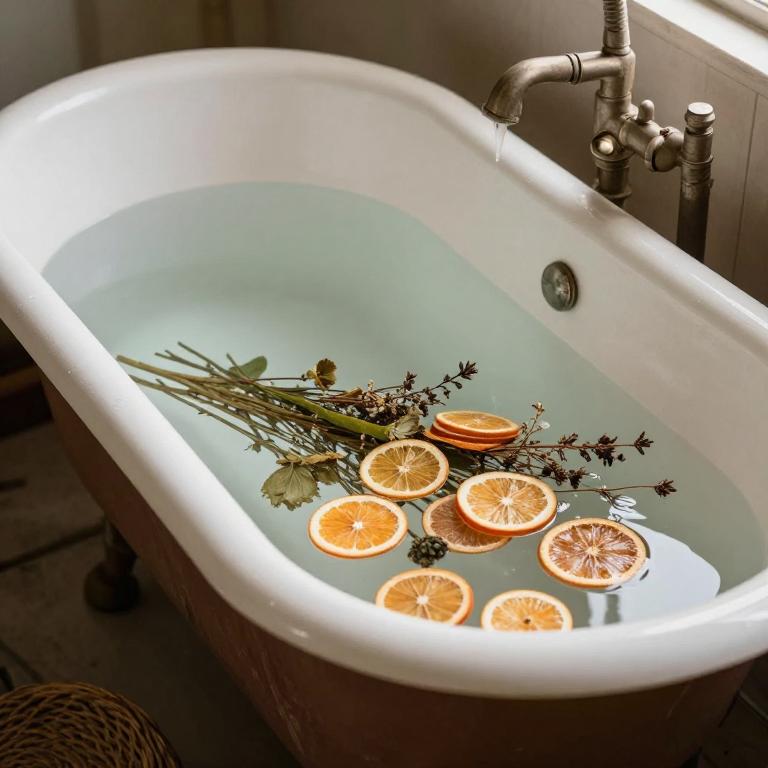
Citrus aurantium herbal baths are used to promote relaxation and alleviate stress by stimulating the release of endorphins through the skin's absorption of its essential oils.
The active compounds in citrus aurantium, such as naringin and limonene, have calming effects that can help reduce anxiety and improve mood. These baths are also believed to enhance circulation and reduce muscle tension, making them beneficial for those suffering from chronic fatigue or muscle soreness. Additionally, the aromatic properties of citrus aurantium can create a soothing environment, aiding in better sleep and overall emotional well-being.
Due to their natural and holistic approach, citrus aurantium herbal baths are increasingly favored in aromatherapy and self-care routines.
78. Basil (Ocimum basilicum)
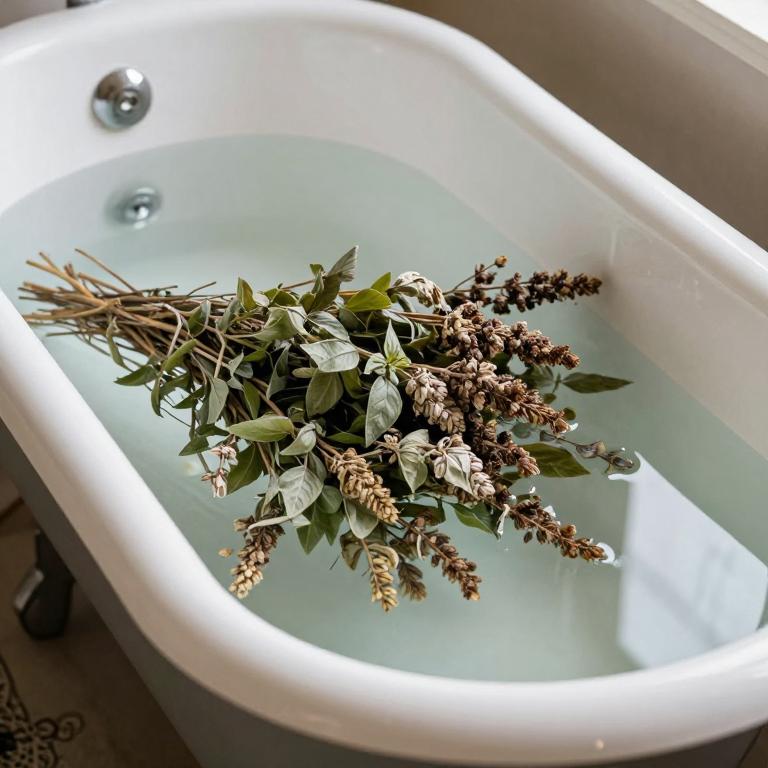
Ocimum basilicum herbal baths are used to promote relaxation and ease muscle tension by leveraging the calming properties of basil essential oils.
These baths can also help soothe skin irritations and reduce inflammation due to the anti-inflammatory compounds present in basil. The aromatic steam from basil-infused water can enhance mental clarity and reduce stress, making it beneficial for emotional well-being. Additionally, basil baths are known to support digestive health when used regularly, as they can help alleviate symptoms of indigestion and bloating.
Overall, ocimum basilicum herbal baths offer a natural and holistic approach to improving both physical and mental health.
79. Pogostemon (Pogostemon cablin)
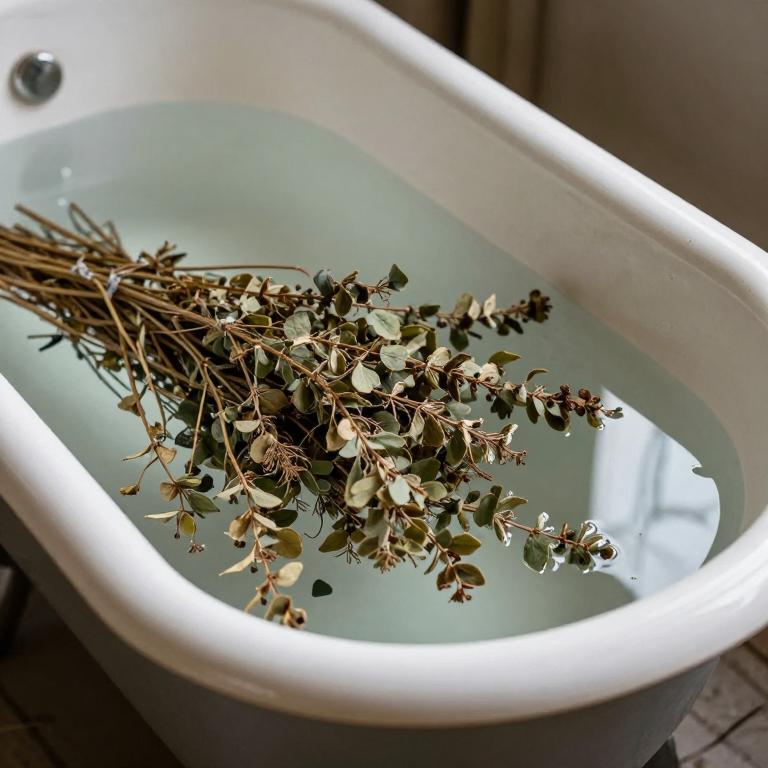
Pogostemon cablin herbal baths are used to promote relaxation and ease muscle tension through their calming and soothing properties.
The essential oil derived from this plant contains compounds that have anti-inflammatory and analgesic effects, making it beneficial for relieving sore muscles and reducing joint pain. These baths are also known to improve circulation and enhance the body's natural ability to detoxify, supporting overall well-being. Additionally, the aromatic properties of pogostemon cablin can have a calming effect on the mind, helping to reduce stress and anxiety.
For these reasons, pogostemon cablin herbal baths are a popular choice in traditional and alternative medicine for their holistic therapeutic benefits.
80. Scots pine (Pinus sylvestris)
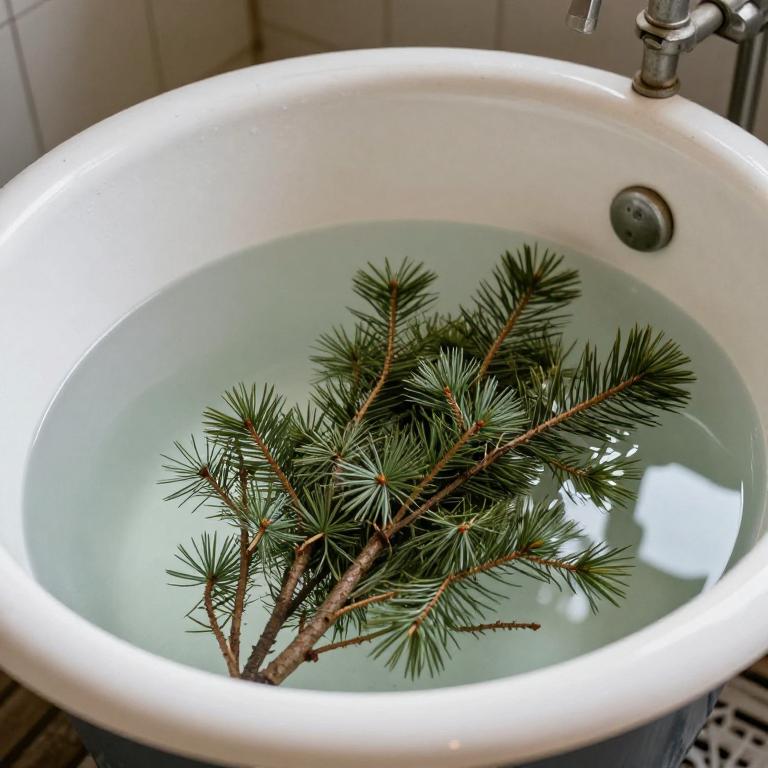
Pinus sylvestris herbal baths are used to promote relaxation and alleviate muscle tension by harnessing the soothing properties of pine needles.
The essential oils extracted from the needles contain compounds like alpha-pinene and camphor, which have anti-inflammatory and analgesic effects. These baths are also believed to improve circulation and reduce stress, making them popular in aromatherapy practices. Additionally, the aromatic qualities of pine can help clear the airways and ease respiratory discomfort.
Overall, pinus sylvestris herbal baths offer a natural and holistic approach to wellness by combining therapeutic aromas with the calming effects of warm water.
81. Garden nasturtium (Nasturtium officinale)

Nasturtium officinale herbal baths are used to promote skin health and reduce inflammation due to their antimicrobial and anti-inflammatory properties.
The plant contains compounds like naphthoquinones and flavonoids, which help soothe irritated skin and may alleviate conditions such as eczema or psoriasis. These baths are also believed to enhance circulation and detoxify the body through the skin, supporting overall wellness. Additionally, the bright, peppery scent of nasturtium can have a calming effect, promoting relaxation and stress relief.
Because of these benefits, nasturtium officinale is a popular choice for natural skincare and therapeutic bathing practices.
82. Heartworts (Leonurus cardiaca)

Leonurus cardiaca herbal baths are used to promote relaxation and alleviate symptoms of stress and anxiety.
The plant, also known as heart herb or red clover, is believed to have calming properties that help soothe the nervous system. These baths are often recommended for individuals seeking natural remedies to improve sleep quality and reduce feelings of tension. The gentle warmth of the water combined with the aromatic compounds from the herb enhances the therapeutic effects.
Due to their mild and soothing nature, leonurus cardiaca herbal baths are considered safe for regular use, making them a popular choice in holistic wellness practices.
83. Kava (Piper methysticum)
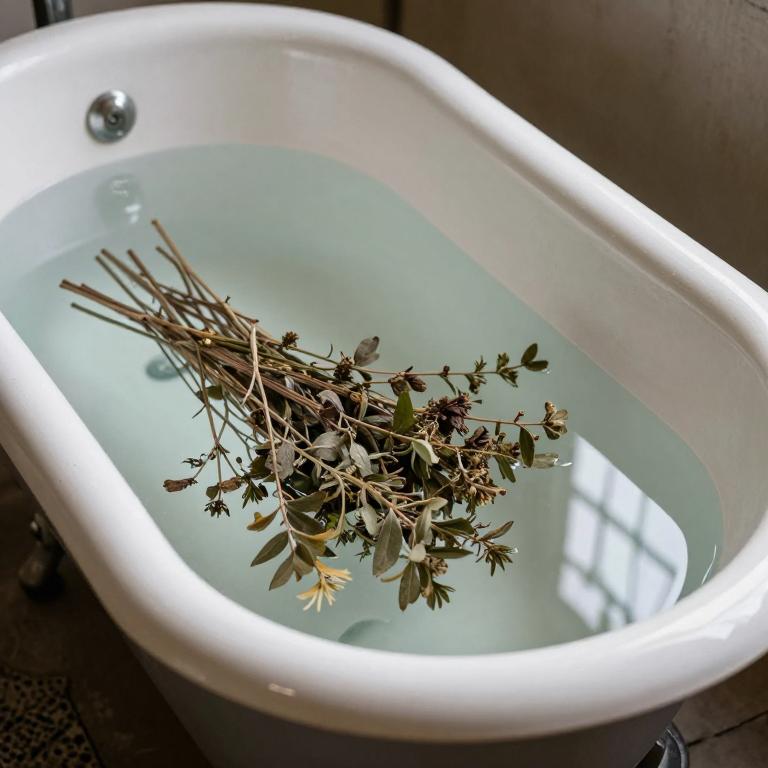
Piper methysticum herbal baths are used to promote relaxation and reduce stress by harnessing the calming properties of kava root.
These baths are often incorporated into traditional Polynesian rituals to foster a sense of community and spiritual well-being. The active compounds in kava, such as kavalactones, help to soothe the nervous system and ease anxiety without causing drowsiness. In modern wellness practices, they are also used to support muscle relaxation and improve sleep quality.
Overall, piper methysticum herbal baths offer a holistic approach to mental and physical health, making them a valued remedy in both cultural and contemporary contexts.
84. Blueberry (Vaccinium myrtillus)

Vaccinium myrtillus herbal baths are used to promote skin health and provide relief from various ailments.
The plant, commonly known as blueberry or cowberry, contains antioxidants and anti-inflammatory compounds that can soothe irritated skin and reduce redness. These baths are often recommended for individuals suffering from eczema, psoriasis, or other inflammatory skin conditions due to their soothing properties. The natural extracts from vaccinium myrtillus also help in detoxifying the skin and improving its overall texture.
Additionally, the aromatic properties of the plant can contribute to relaxation and stress relief, making these baths a holistic approach to wellness.
85. Coltsfoot (Tussilago farfara)

Tussilago farfara herbal baths are used to soothe skin irritations and promote healing through their anti-inflammatory and antiseptic properties.
The plant, commonly known as coltsfoot, contains compounds that can help reduce redness, itching, and inflammation associated with eczema, psoriasis, and other dermatological conditions. These baths are particularly beneficial for individuals with sensitive skin or those suffering from chronic skin disorders due to their gentle yet effective nature. The warm water combined with the herbal infusion helps to open pores and enhance the absorption of beneficial compounds into the skin.
Overall, tussilago farfara herbal baths offer a natural and holistic approach to skin care, supporting both comfort and long-term skin health.
86. Opium poppy (Papaver somniferum)

Papaver somniferum herbal baths are used to promote relaxation and alleviate symptoms of stress and anxiety by incorporating opium poppy-derived compounds into bath water.
These baths are believed to have soothing effects on the nervous system, helping to reduce tension and induce a calming state. The presence of alkaloids such as morphine and codeine in the herbal formulations may contribute to their sedative properties, making them useful for those seeking natural remedies for insomnia or chronic pain. However, due to the potential for addiction and legal restrictions, their use is typically limited to controlled and therapeutic settings.
Despite these concerns, some traditional and alternative medicine practices continue to explore the benefits of papaver somniferum in holistic health approaches.
87. Cymbopogon flexuosus

Cymbopogon flexuosus herbal baths are used to promote relaxation and reduce stress by leveraging the calming properties of its essential oils.
These baths are also known to alleviate symptoms of anxiety and insomnia, offering a natural alternative to conventional stress relief methods. The aromatic compounds in cymbopogon flexuosus can help improve mood and enhance mental clarity, making it beneficial for individuals seeking holistic wellness. Additionally, these baths are used to soothe muscle tension and ease joint pain, thanks to their anti-inflammatory and analgesic effects.
Overall, cymbopogon flexuosus herbal baths are valued for their ability to support both physical and emotional well-being through aromatherapy and natural therapeutic benefits.
88. Melilot (Melilotus officinalis)

Melilotus officinalis herbal baths are used to promote relaxation and alleviate symptoms of stress and anxiety by stimulating the central nervous system through its aromatic compounds.
These baths are also beneficial for improving circulation due to the presence of compounds like coumarin, which have vasodilatory effects. The soothing properties of melilotus officinalis make it an effective remedy for muscle pain and joint inflammation, often used in traditional medicine for rheumatic conditions. Additionally, the herb is believed to support skin health by reducing inflammation and promoting a calming effect on the skin.
Overall, melilotus officinalis herbal baths offer a natural and holistic approach to enhancing well-being through both physical and emotional relief.
89. Indian frankincense (Boswellia serrata)

Boswellia serrata herbal baths are used to promote joint health and reduce inflammation in the body.
The active compounds in boswellia serrata, such as boswellic acids, have been shown to inhibit inflammatory responses, making these baths beneficial for individuals suffering from arthritis or other inflammatory conditions. Additionally, the soothing properties of the herb can help alleviate muscle pain and stiffness, providing relief for those with chronic pain disorders. These baths also support skin health by improving circulation and reducing redness or irritation.
Overall, boswellia serrata herbal baths offer a natural and holistic approach to managing inflammation and enhancing overall well-being.
90. Buckwheat (Plantago ovata)

Plantago ovata herbal baths are used to promote skin health and relieve various skin conditions due to their soothing and anti-inflammatory properties.
The seeds of this plant contain mucilage, which helps to moisturize and protect the skin, making these baths beneficial for individuals with dryness or irritation. They are also known to reduce redness and itching, making them a natural remedy for eczema and psoriasis. Additionally, plantago ovata baths can help detoxify the skin and improve its overall texture by removing impurities and excess oils.
These baths are preferred for their gentle nature, making them suitable for sensitive skin and a safe alternative to chemical-based treatments.
91. Cyperus rotundus

Cyperus rotundus herbal baths are used to promote relaxation and alleviate skin conditions due to their calming and anti-inflammatory properties.
The plant, commonly known as nutgrass, contains bioactive compounds that help soothe irritations and reduce redness when used in bath water. These baths are also believed to improve circulation and ease muscle tension, making them beneficial for individuals experiencing stress or physical discomfort. In traditional medicine, cyperus rotundus is valued for its ability to detoxify the body and support overall well-being through its purifying effects.
As a result, these herbal baths are increasingly popular for their natural, holistic approach to health and self-care.
92. Oat (Avena sativa)

Avena sativa herbal baths are used to promote relaxation and soothe the skin through the natural properties of oat extract.
These baths are particularly beneficial for individuals suffering from dryness, irritation, or eczema due to the anti-inflammatory and moisturizing effects of avena sativa. The soothing properties of oat baths can also help alleviate symptoms of psoriasis and dermatitis by reducing redness and itching. Additionally, they are often recommended for stress relief and improving sleep quality, as the calming aroma and warmth of the bath can ease tension and encourage relaxation.
Overall, avena sativa herbal baths offer a natural and effective way to care for the skin and enhance overall well-being.
93. Verbenas (Verbena officinalis)

Verbena officinalis herbal baths are used to promote relaxation and soothe skin irritations due to their calming and anti-inflammatory properties.
The plant contains compounds like flavonoids and tannins that help reduce redness and inflammation, making these baths beneficial for conditions like eczema and psoriasis. Additionally, verbena officinalis is known to have a mild sedative effect, which can help alleviate stress and improve sleep quality. Its aromatic qualities also contribute to a sense of well-being, enhancing the overall experience of the bath.
For these reasons, verbena officinalis herbal baths are a popular choice in traditional and alternative medicine for their holistic health benefits.
94. Maca (Lepidium meyenii)

Lepidium meyenii herbal baths are used to promote relaxation and alleviate symptoms of stress and anxiety.
The active compounds in this herb, such as alkaloids and flavonoids, are believed to have calming effects on the nervous system. These baths are also known to improve skin health by reducing inflammation and promoting circulation. In traditional medicine, they are often used to support digestive wellness and detoxification processes.
The soothing properties of lepidium meyenii make it a popular choice for holistic therapies aimed at enhancing overall well-being.
95. Parsley (Petroselinum sativum)

Petroselinum sativum herbal baths are used to promote relaxation and ease muscle tension by leveraging the calming properties of parsley.
The essential oils and phytochemicals present in parsley help soothe the nervous system, making these baths ideal for reducing stress and anxiety. They are also beneficial for improving circulation and alleviating minor skin irritations due to their mild antiseptic and anti-inflammatory effects. Additionally, parsley baths can aid in detoxification by supporting the body's natural processes through its diuretic properties.
Overall, petroselinum sativum herbal baths offer a natural and soothing way to enhance wellness and promote overall health.
96. Black cohosh (Cimicifuga racemosa)
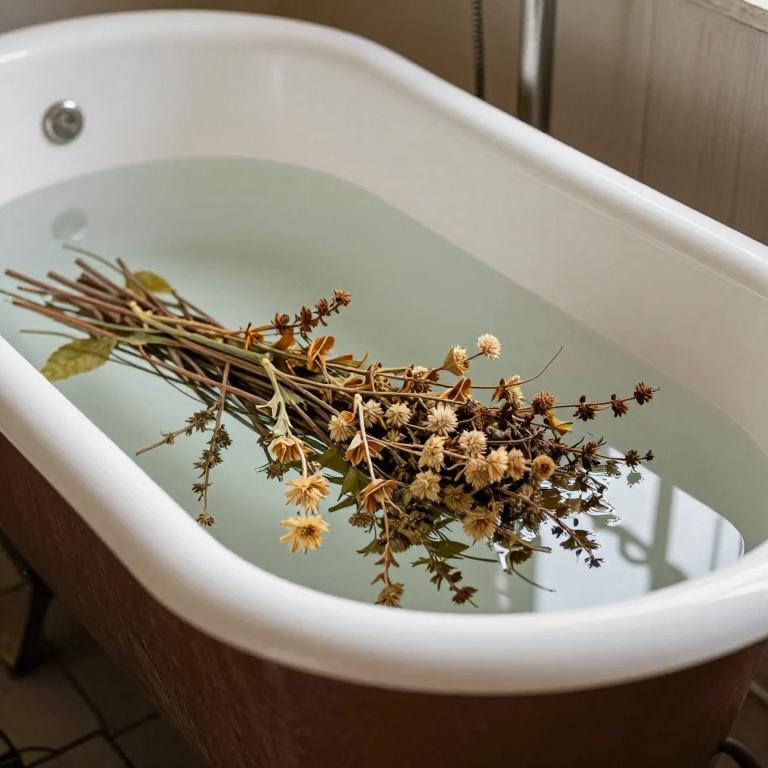
Cimicifuga racemosa herbal baths are used to promote relaxation and alleviate symptoms of menopause, such as hot flashes and mood swings.
The plant, also known as black cohosh, contains compounds that may help balance hormonal fluctuations, offering a natural alternative to conventional treatments. These baths are often infused with other calming herbs like lavender or chamomile to enhance their soothing effects. They can also help reduce muscle tension and improve sleep quality, making them beneficial for overall well-being.
Due to their mild and holistic approach, cimicifuga racemosa herbal baths are increasingly popular among those seeking natural remedies for stress and hormonal imbalances.
97. Wheat (Triticum aestivum)
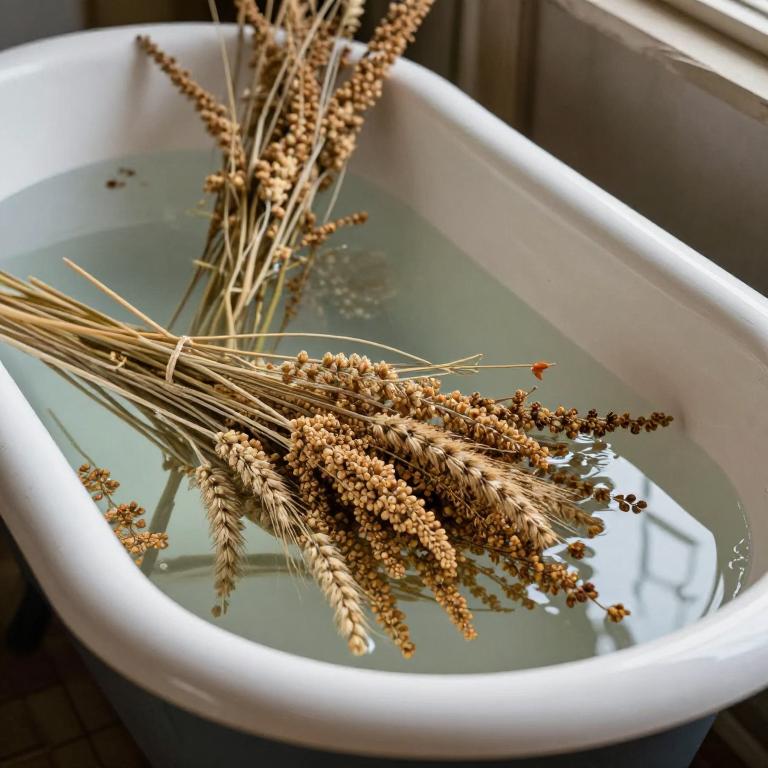
Triticum aestivum herbal baths are used to promote relaxation and alleviate stress by soothing the nervous system through the calming properties of wheatgrass.
These baths can also help in reducing inflammation and improving skin health due to the presence of antioxidants and essential nutrients in wheatgrass. They are commonly used in aromatherapy practices to enhance mental clarity and emotional well-being. The natural compounds in triticum aestivum may also aid in detoxifying the body and supporting the immune system.
Overall, these herbal baths offer a holistic approach to wellness by combining therapeutic benefits with a sensory experience.
98. Cucumber (Cucumis sativus)

Cucumis sativus herbal baths are used to promote relaxation and ease muscle tension by leveraging the cooling properties of cucumber.
The natural compounds in cucumis sativus help soothe the skin and reduce inflammation, making these baths beneficial for individuals with skin irritations or minor burns. Additionally, the mild scent of cucumis sativus can have a calming effect, aiding in stress relief and improving overall mood. These baths are also popular for their ability to detoxify the skin and improve its hydration levels.
Due to their gentle nature, cucumis sativus herbal baths are suitable for all skin types, including sensitive ones, making them a versatile and safe option for holistic wellness.
99. Goosefoot (Chenopodium album)

Chenopodium album herbal baths are used to promote skin health and alleviate various inflammatory conditions.
The plant's natural compounds, such as flavonoids and saponins, have anti-inflammatory and antimicrobial properties that help soothe irritated skin and reduce redness. These baths are also beneficial for individuals suffering from eczema, psoriasis, or other skin disorders due to their soothing and detoxifying effects. The warming effect of the bath enhances circulation, which can aid in reducing swelling and improving overall skin texture.
Additionally, chenopodium album is believed to support the body's natural healing processes, making it a valuable remedy in traditional herbal medicine.
100. Golden root (Rhodiola rosea)
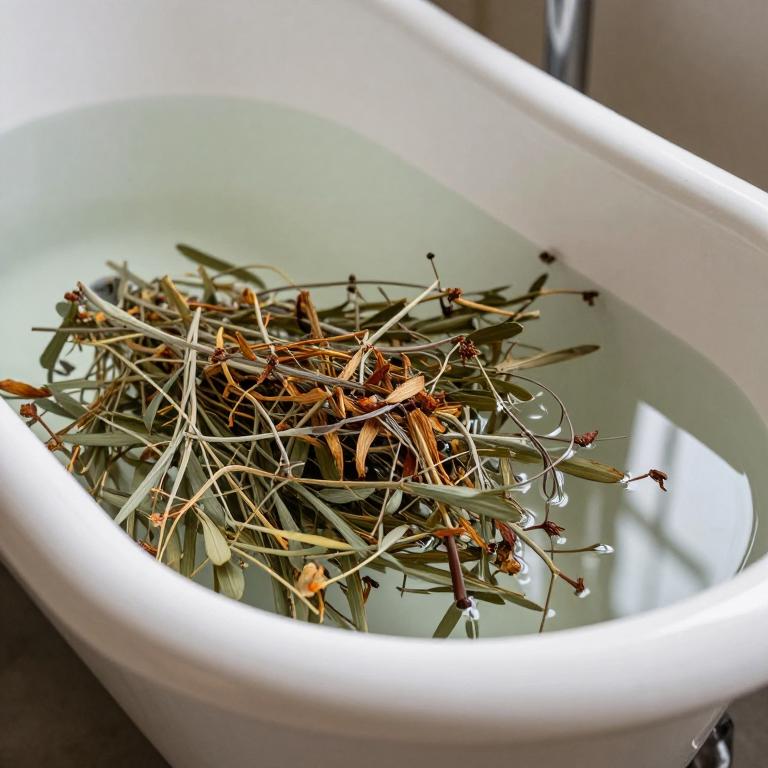
Rhodiola rosea herbal baths are used to promote relaxation and reduce stress by harnessing the adaptogenic properties of the plant.
These baths can help alleviate symptoms of fatigue and improve overall mood through the soothing effects of the herb's essential oils. The anti-inflammatory and antioxidant compounds in rhodiola rosea may also support skin health and reduce irritation when used in bath form. Additionally, the calming aroma of rhodiola rosea can enhance mental clarity and create a sense of well-being during bath time.
Because of these benefits, rhodiola rosea herbal baths are increasingly popular as a natural remedy for both physical and emotional wellness.